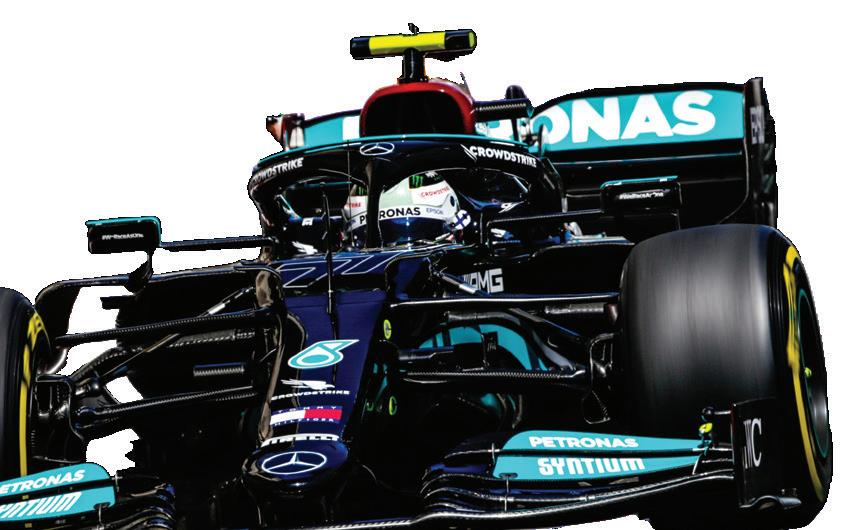


30 YEARS OF STRENGTH
Agua Caliente Casinos observes a major milestone





Agua Caliente Casinos observes a major milestone



Publisher: Peter White
Tel: +44 (0) 1892 740869
Mob: +44 (0) 7973 273714 peter@outsourcedigitalmedia.com
Editorial:
Editor in Chief : David McKee dmckee@huntingtonpress.com
Editor EMEA: Damien Connelly damien@outsourcedigitalmedia.com
Columnist: Raymond Chan ymrchan@hotmail.com
Victor H. Royer
International Features Editor victor@outsourcedigitalmedia.com
Associate Editor EMEA: Andrew Behan a.behan@librasgroup.com
Las Vegas Correspondent: Ryan Slattery RyanSlats@gmail.com
International Correspondent: Lyudmyla Kyrychenko lyudmyla.kyrychenko@outsource digitalmedia.com
Production:
Designer: Stewart Hyde stewart@de5ign.co.uk www.de5ign.co.uk
Accounts: Helen Holmes accounts@outsourcedigitalmedia.com
IT Director: Pasha Kuzminskiy pasha@outsourcedigitalmedia.com
This year, tribally owned and run Agua Caliente Casinos marks 30 years in business. That’s noteworthy not only for a long-running success story but also in how it testifies to the length and durability of tribal gaming. Recent events in North Dakota also make it painfully apt.
The North Dakota Legislature recently – and overwhelmingly – voted down a potentially money-spinning proposal for casino gambling. Why? Because those asking for permission to explore the land-into-trust and commercial-viability routes had the misfortune to be Native American.

More specifically, they were the Turtle Mountain Band of Chippewa. They wanted to explore the prospect of building a casino near Grand Forks. Now, there’s precious little to do in North Dakota, a remote and thinly populated state. The attraction of a casino should be obvious. Plus, in more-peaceful times, it could well capture tourist dollars from Canada.
That wasn’t good enough for the cretins who double as North Dakota lawmakers. They saw red – and red skin. Unearthing a canard popularized by former South Dakota governor Kristi Noem, one lawmaker baselessly accused the Chippewa of criminal associations. Wailed knuckle-dragging state Sen. Diane Larson, “I never did get an answer for where the money is coming from. Cartels or what? I don’t know where it’s coming from.”
Grow up, you old battle-ax. Indigenous people have been building casinos in the United States for 37 years, ever since the Indian Gaming Regulatory Act of 1988 (signed into law by none other than then-President Ronald Reagan). None of the 525 tribal casinos in the U.S. was financed by a criminal enterprise. Larson’s ethnic slur is a convenient slander and she probably knows it.
Larson was joined in infamy by fossilized state Rep. Lawrence Klemen, who slimily insinuated that the Chippewa were somehow financed by Chinese Communists. As you know, Native American casinos share their wealth amongst tribal members, directly and/or indirectly, depending on the tribe. This was suspect to Klemen, who equated revenue sharing with Communism. Actually, tribes are getting their development dollars from those hotbeds of Bolshevism, the private-sector casino industry and Wall Street. The very week the Chippewa were being defamed in the Dakotas, Vici Properties announced it would underwrite a major tribal casino in California, following the lead of those notorious Commies, Gaming & Leisure Properties, the first real estate investment trust to invest in tribal gaming. Who knew that CEOs Ed Pitoniak and Peter Carlino were such shady and subversive characters?
North Dakota lawmakers have tried dunce caps on for size and, boy, did they fit. There’s no excuse for this kind of willful stupidity, compounded with blatant, shameless racism, least of all in 2025. The Turtle Mountain Band deserves an apology. So do we.
David McKee Editor

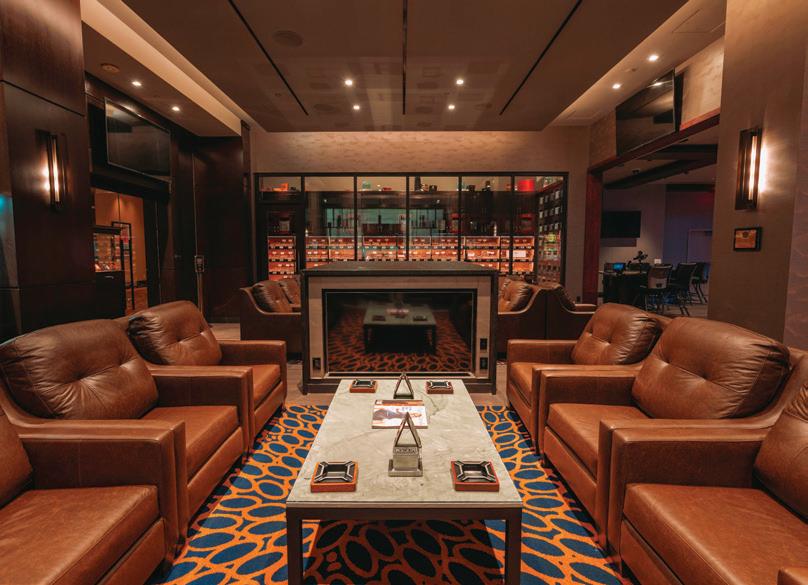
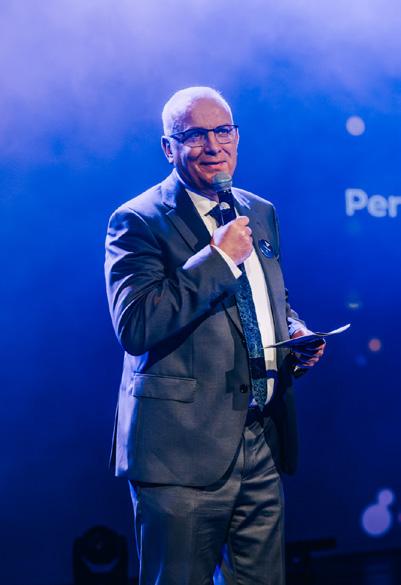



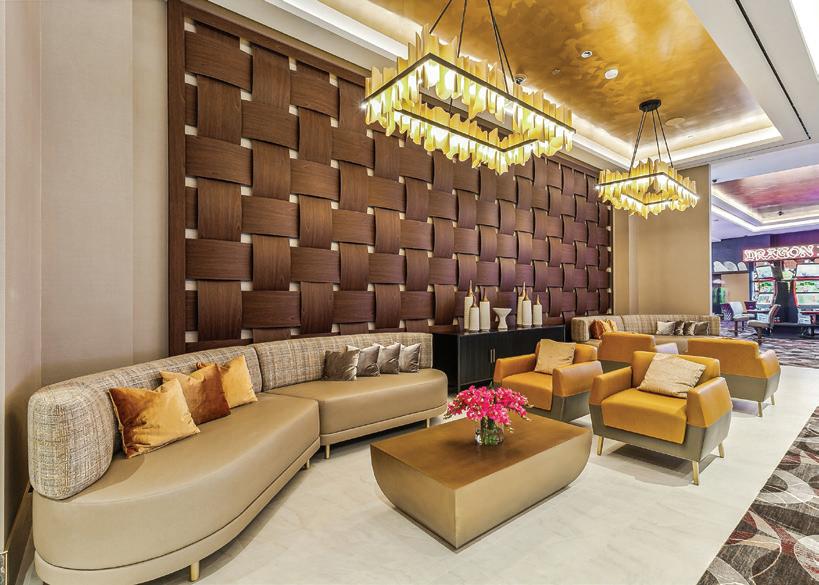
his column offers expert insights on leisure, entertainment and casinos worldwide. Drawing on over 25 years of experience, I highlight standout resorts, key industry events and emerging trends shaping the future of gaming and hospitality.
THaving attended countless shows over the years, this year’s Global Gaming Expo Asia brought an unexpected delight that truly elevated my experience.
My flight booking agent had reserved a room for me at the Conrad Hotel, which is seamlessly integrated into The Londoner resort. On previous visits, I had only seen scaffolding and construction. So I was completely unprepared for the impressive transformation that awaited me.
I’ve visited many themed resorts but few have captured a city’s spirit as authentically as The Londoner. Located in the heart of Cotai, The Londoner Macao is a beautifully executed tribute to London’s iconic charm, grandeur and culture. The striking exterior features a replica of Elizabeth Tower and the Houses of Parliament, while the Crystal Palace atrium, inspired by Victorian elegance, immediately sets a tone of refinement and splendor.
From the moment I stepped inside, I was immersed in a warm, nostalgic atmosphere – complete with a soundtrack of timeless British hits from The Beatles, The Kinks, Elton John and The Rolling Stones. The entire setting felt vibrant yet inviting.
I especially enjoyed my visit to Churchill’s Table, where the ambiance, décor and service delivered a truly authentic British dining experience.
With a 6,000-seat arena, a world-class casino, exceptional restaurants and top-tier wellness facilities, The Londoner seamlessly blends luxury, entertainment, and heritage. Every element is thoughtfully curated, making the experience feel both grand and personal.
Plaudits to everyone at The Londoner Macao – your superb hospitality and meticulous attention to detail have left a lasting impression. I loved every moment and will undoubtedly be back.
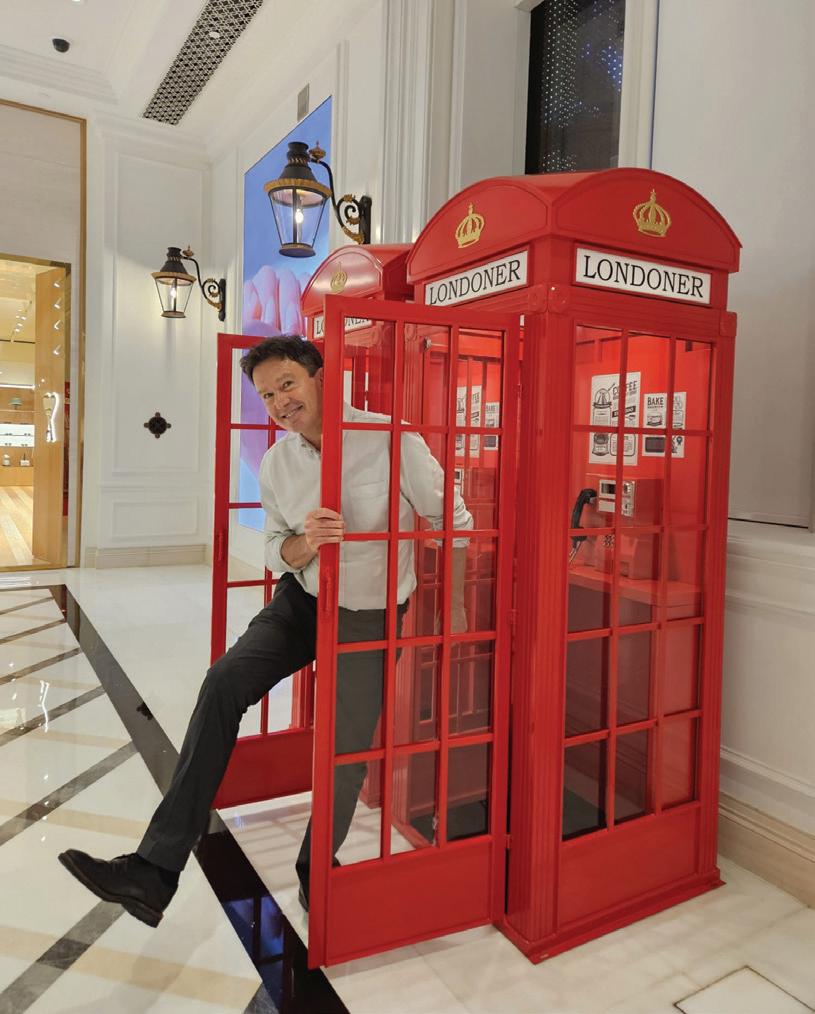


Sports Betting Operator provides technology features, news and new product information, keeping online gambling companies up to date with the fastest growing gambling sector in the world

A highly regarded team of Internationally experienced journalists, all of whom have a wealth of knowledge in online and land-based gaming involving, legislation, e-commerce, responsible gambling along with the latest online operating systems and solutions.

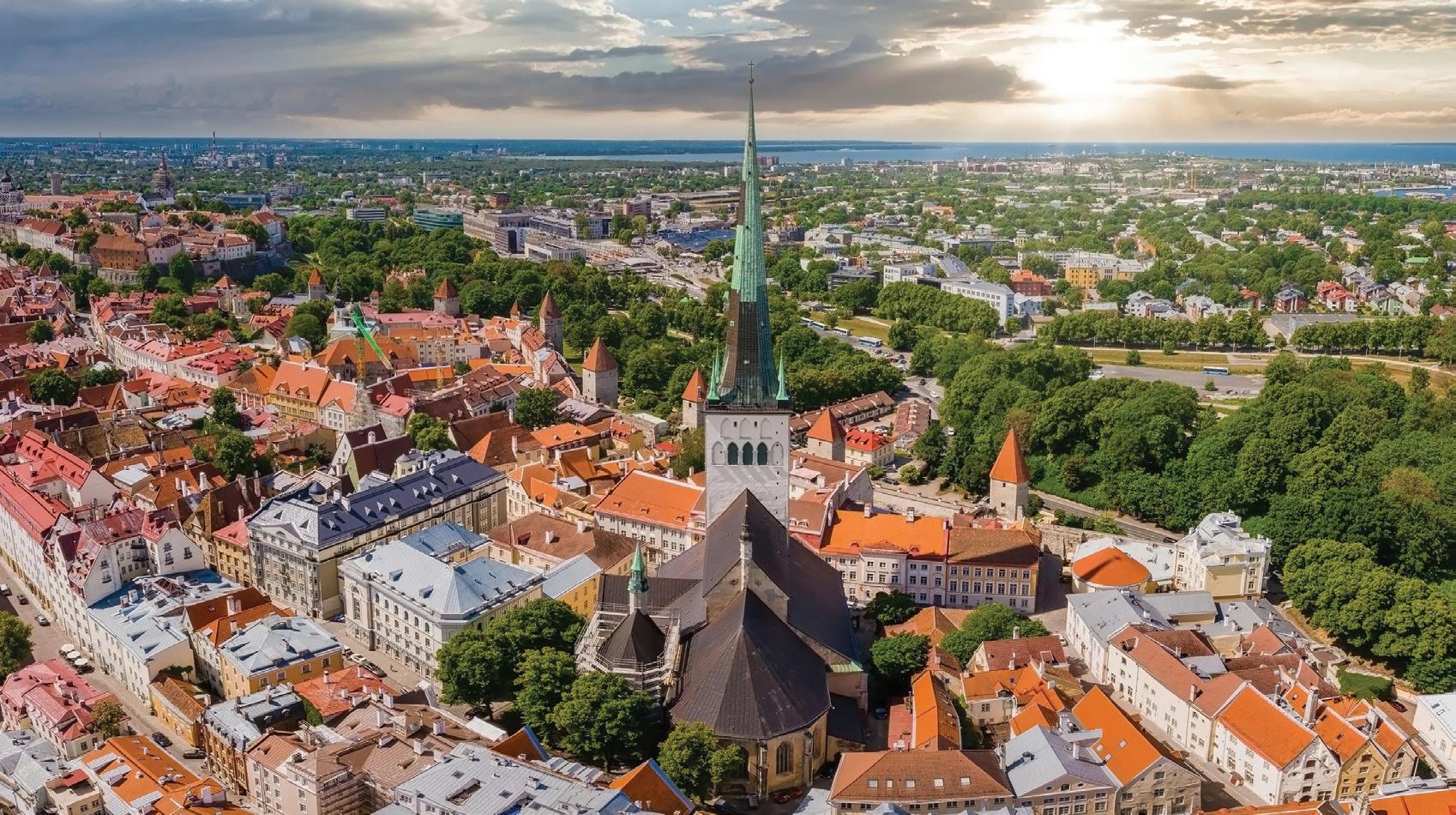
By Kevin McGowen
aving worked in the gaming, entertainment and hospitality industries for over three decades, I’ve seen countless destinations rise and fall in popularity. They were chasing trends without truly understanding the delicate balance of service, atmosphere and authenticity. So when I encounter a market—and a brand—that truly grasps the nuance of delivering exceptional experiences across diverse audiences, it’s worth taking notice.
HThat’s precisely what I found in Tallinn, Estonia, a sophisticated and little-known jewel on the edge of Northern Europe. Tallinn is quietly positioning itself as the next must-visit destination for affluent global travelers.
Tallinn, perched gracefully between the Baltic Sea and the Gulf of Finland, has long flown under the radar of mainstream tourism. Its beautifully preserved, medieval, old town is a UNESCO World Heritage site, steeped in Hanseatic history and cobbledstreet charm. But make no mistake—this is not a city trapped in time. With direct flights from cultural
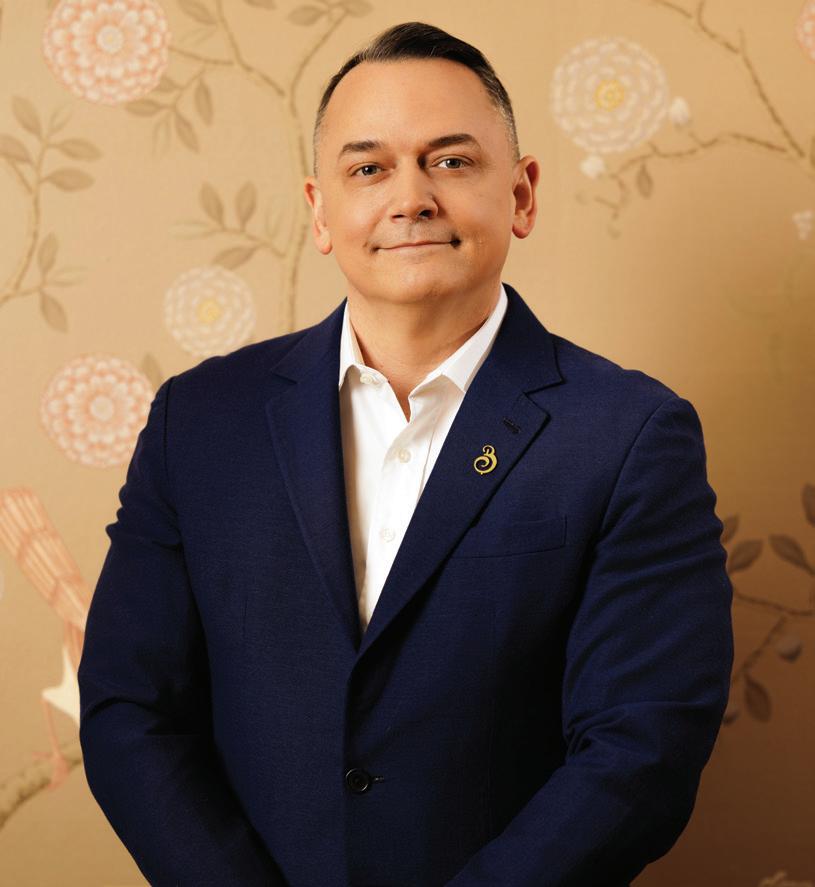
Kevin McGowen, Chief Executive, Bombay Group
capitals like Helsinki, Stockholm, Berlin, Paris, and London, it’s now emerging as a seamless fusion of heritage and high-end hospitality.









2 - 3 JULY 2025







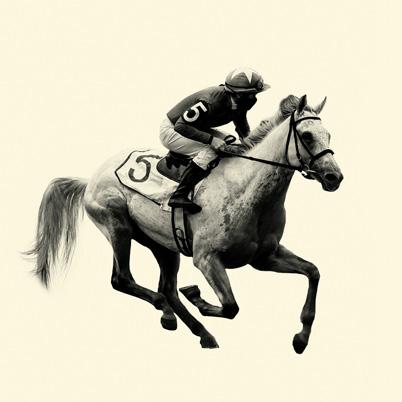

Even though Tallinn can be vibrant and entertain you really well, one may easily remain anonymous and enjoy their privacy here as well. That is a priceless combination in my book, knowing the types of high-value gaming entertainment seekers who appreciate that compelling mixture of fun when you want it and privacy when you need it.
This transformation is thanks, in no small part, to the vision of Bombay, the international luxury brand that has planted its flag firmly in Tallinn’s vibrant soil. Through the Bombay Club and the Burman Hotel, they’ve crafted a uniquely curated holiday destination—one that effortlessly balances old-world elegance with cutting-edge entertainment.
The Bombay Club isn’t your average social lounge. It’s a refined playground for connoisseurs of gaming and poker, with intimate settings, exclusive access, and an atmosphere that evokes the golden age of European high society with a healthy dash of Las Vegas, London, and the Far East to add to the mix. This place creates authentic experiences that are truly worthy of a story.
Meanwhile the Burman Hotel redefines Baltic luxury—offering world-class service, striking interior design and curated experiences that rival the finest resorts in Monaco or St. Moritz. The newly renovated heritage hotel is 176 years old and is the oldest continually operating hotel in Estonia. I really love the heritage and comfort of this amazing boutique luxury hotel.
But what truly sets this enclave apart is its culinary ambition. From high-end Cantonese delicacies and exquisite French tasting menus to avant-garde Japanese fare, Tallinn is quickly becoming a dining destination in its own right—led by talent imported from global gastronomic capitals.
This isn’t about mass tourism. This is about meaningful travel: Experiencing a city where the echoes of medieval towers coexist with rooftop cocktails, where centuries-old stone streets lead you to modern Michelin-worthy restaurants. It’s about discovering a place before the world does.
Please have a look at visitestonia.com to see what I mean and visit BombayClub.com to learn more and plan your next holiday journey.




















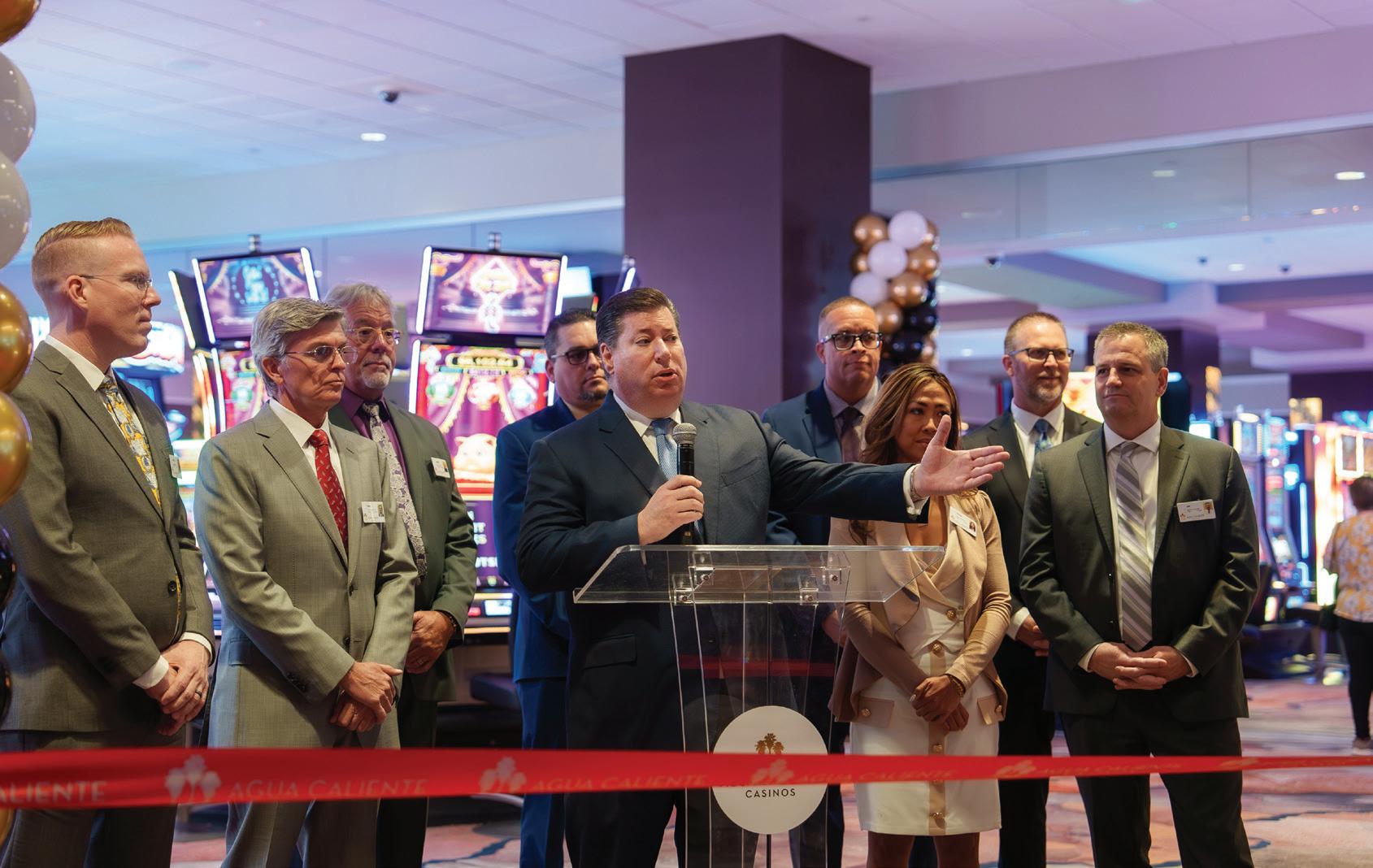
Three decades on, Agua Caliente Casinos strives for broad appeal.
By Damien Connelly
s Agua Caliente Casinos celebrates a landmark 30 years of resort operations, the esteemed gaming and hospitality group continues to demonstrate its forward-thinking vision with the unveiling of a major expansion at its Rancho Mirage property. With over 250 new slot machines, expanded table game offerings and a renewed commitment to delivering a premium guest experience, the milestone underscores the tribe’s enduring commitment to excellence and innovation.
ACasino Life sat down with Saverio R. Scheri III, chief operating officer of Agua Caliente Casinos, to discuss the expansion, reflect on three decades of success and look ahead to what’s next for this dynamic casino brand.
Congratulations on the latest expansion at Rancho Mirage. Could you share some insight into the strategic thinking behind this development and how it aligns with the longterm vision of Agua Caliente Casinos? Our goal is to create the ultimate guest experience for our customers. We want our guests to easily locate their favorite slot machines and find them available, even on the busiest nights. To achieve this, we’ve not only introduced a wide range of new titles and the latest slot machines throughout our entire floor, but we’ve also increased the number of machines. By offering additional games and the newest versions, we can eliminate wait times, ensuring that guests quickly find the games they love.
With over 250 new slot machines and additional tables now operational, what types of games or exclusive titles are proving particularly popular with guests?
Agua Caliente has always showcased the latest and greatest slot machines on our floor, and we strive to consistently offer the newest titles. More importantly, we aim to provide a unique experience for our customers by featuring games that are exclusive to Agua Caliente Casinos and the Coachella Valley. Achieving this isn't always easy, but we want our customers to feel special when they visit us and leave saying, “You know what? I just played a machine that’s only available at this casino.”
For instance, we are currently the only casino in Southern California offering Aristocrat's new Hyper Link games, and we are the first in the Coachella Valley to present Fire Link Triple Nova, Huff and Extra Puff, Hot Double Blazing Lock, Red Hot Jackpots, Bang Bam Boom, and Miners' Dream. We take pride in providing these exceptional gaming options.
How does this expansion enhance the overall guest experience at Rancho Mirage, and what new amenities or features can regular patrons look forward to?
I’ve visited many casinos and noticed how some casino floors struggle with proper flow, often becoming obstructed. We took this into consideration in our expansion, creating a new addition that seamlessly extends the main casino floor. This is essential for us, as we aim for a natural flow throughout our entire property. From the moment you enter the casino floor to navigating to our showroom, reaching our restaurants and finding your favorite game – whether it’s slots or table games – we wanted everything to be interconnected. This vision was the driving force behind the design of our expansion. We’re very excited for our customers to experience this enhanced venue, which feels even bigger and better now.
Agua Caliente has consistently emphasised elevating the gaming experience. How has guest feedback shaped the design or offerings of this new space?
With Agua Caliente Rancho Mirage being a Forbes Travel Guide triple winner – our hotel and steakhouse each holding four stars, our spa earning five stars

and our resort recognized as a AAA Four Diamond property – guests have come to expect a certain standard at all three Agua Caliente Casinos. We are committed to exceeding those expectations, as evidenced by our many accolades. During the design process, we take our time to ensure outstanding results. Specifically with this casino expansion, we’re dedicated to maintaining the high standards our guests have come to expect.
This year marks a major milestone – 30 years in gaming. Reflecting on that journey, what are some of the pivotal moments or turning points that have shaped the brand’s growth?
The key to our success – and a guiding principle for the tribe – has always been its vision. Many casinos, whether tribal or commercial, can sometimes rush into decisions without proper planning or consideration for the long-term implications. They often fail to think

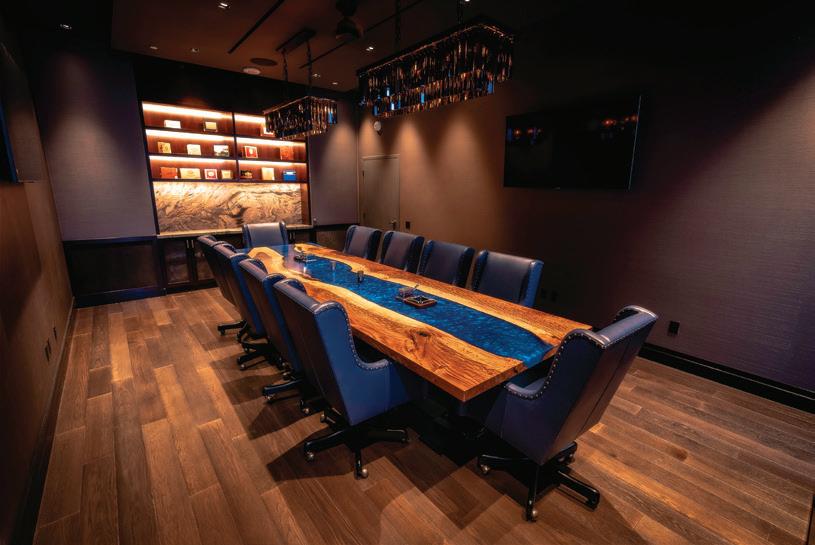
about what their choices will mean five, 10 or even 20 years down the line. In contrast, this tribe approaches decisions with careful thought, which is one of the many reasons for their success. When you look at all they have achieved and compare it to other casinos across the country – not just tribal casinos – Agua Caliente truly stands out from the rest.
The properties boast numerous accolades, from a Forbes four-star hotel to the top-rated Sec-he Spa. How do you maintain such consistently high standards across multiple venues?
Achieving Forbes four stars and AAA Four Diamond is often easier than maintaining them. We accomplish
this by hiring outstanding team members to work in Agua Caliente Casinos – a statement I don’t take lightly. It all begins with our HR department, which excels at recruiting, hiring and onboarding exceptional talent, from line employees to executives. This recruitment process is truly the foundation of our success.
Next comes our training. Our commitment to training is continuous, year-round and spans all departments, which is no small feat. It requires substantial investment and must be executed effectively and meaningfully. The key to successful training lies in getting our team members to fully engage in the process. If they perceive it as a waste of time, they will struggle to internalize and apply what they’ve learned. However, when they genuinely buy in and start implementing the training, it transforms into something authentic. They engage out of a desire to excel, rather than obligation, making it second nature to them. It becomes an integral part of who they are as members of this family.
You mentioned new projects on the horizon. Can you offer any preview of what’s in the pipeline, whether in terms of expansion, innovation or guest services?
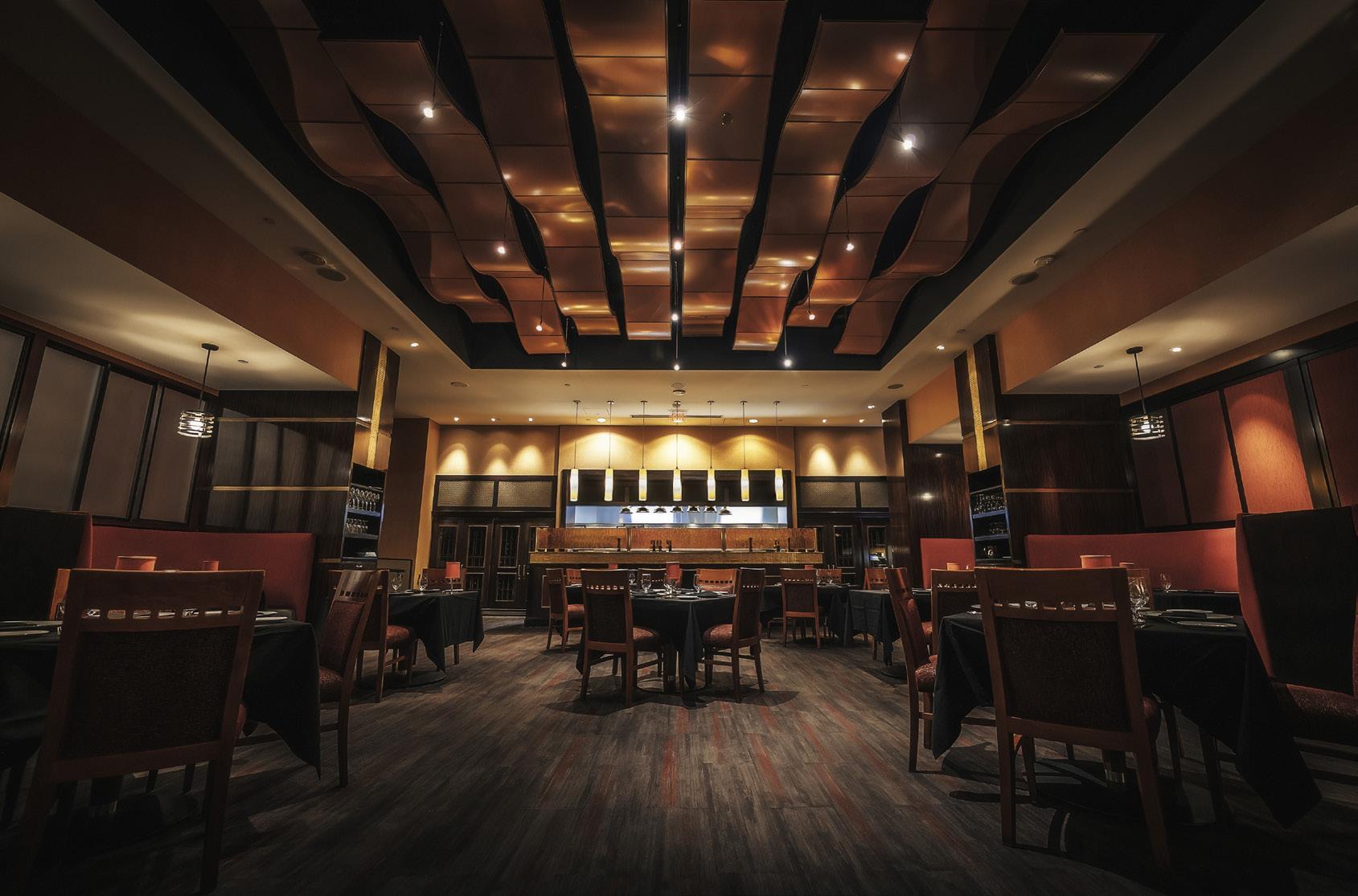
First and foremost on our agenda is a complete refurbishment of all our hotel rooms. We couldn’t be more excited about it. Although our hotel rooms are currently fabulous and have been well received since we opened, we haven't made any updates since then, so it's time for a refresh. This refurbishment will be a complete transformation, elevating the guest experience to a whole new level. We’ll be kicking off this project in the next few weeks.
Agua Caliente Casinos’ culinary team is world-class. In addition to our award-winning restaurants across all three properties, the team strives to deliver one-of-akind dining experiences regularly. For example, this June we will be introducing “Raising the Steaks,” a new series of extraordinary culinary collaborations at our Rancho Mirage property. Agua Caliente's culinary team invites an award-winning chef to collaborate on an incredible experience for our diners.
The first one in this series begins June 13. It will be a two-week activation starring internationally acclaimed chef and restauranteur David Burke. Chef Burke and his team have been working with our chef and team to activate Red Horse by David Burke, his East Coast-celebrated, modern steakhouse. “Raising the Steaks” is hosted inside The Steakhouse at Agua Caliente Rancho Mirage. This upcoming immersive
experience includes Red Horse restaurant-design elements and Chef Burke's most coveted dishes, which share his distinct American and Asian fusion of flavors.
As the industry continues to evolve with digital technologies and shifting player preferences, how is Agua Caliente preparing to meet the next generation of guest expectations? And finally, with such a rich history and a strong presence across Coachella Valley, how do you see the role of Agua Caliente Casinos evolving within both the regional and broader gaming landscape over the next 10 years?
I’ve been in this industry for a long time, and have witnessed numerous solutions and technological innovations come and go, such as skill-based gaming and server-based gaming. None have truly gained traction. However, we are currently seeing significant growth in online sports and gaming, which we are excited about. In the United States, gaming is regulated at the state level rather than federally. While California does not currently offer online gaming or sports wagering, there are various promising solutions that may be permissible under a different technology classification, specifically Class II gaming. We are
Get Into Casino Life & Sports Betting Operator TV and gain insights from Presidents, CEOs, Owners and Senior Management at the World’s Leading Resort Casino and Sports Book Operators along with latest developments from manufacturers and Suppliers along with Gaming Equipment and Systems providers from Senior representatives at a select number of leading organisations in the Global Gaming Industry.

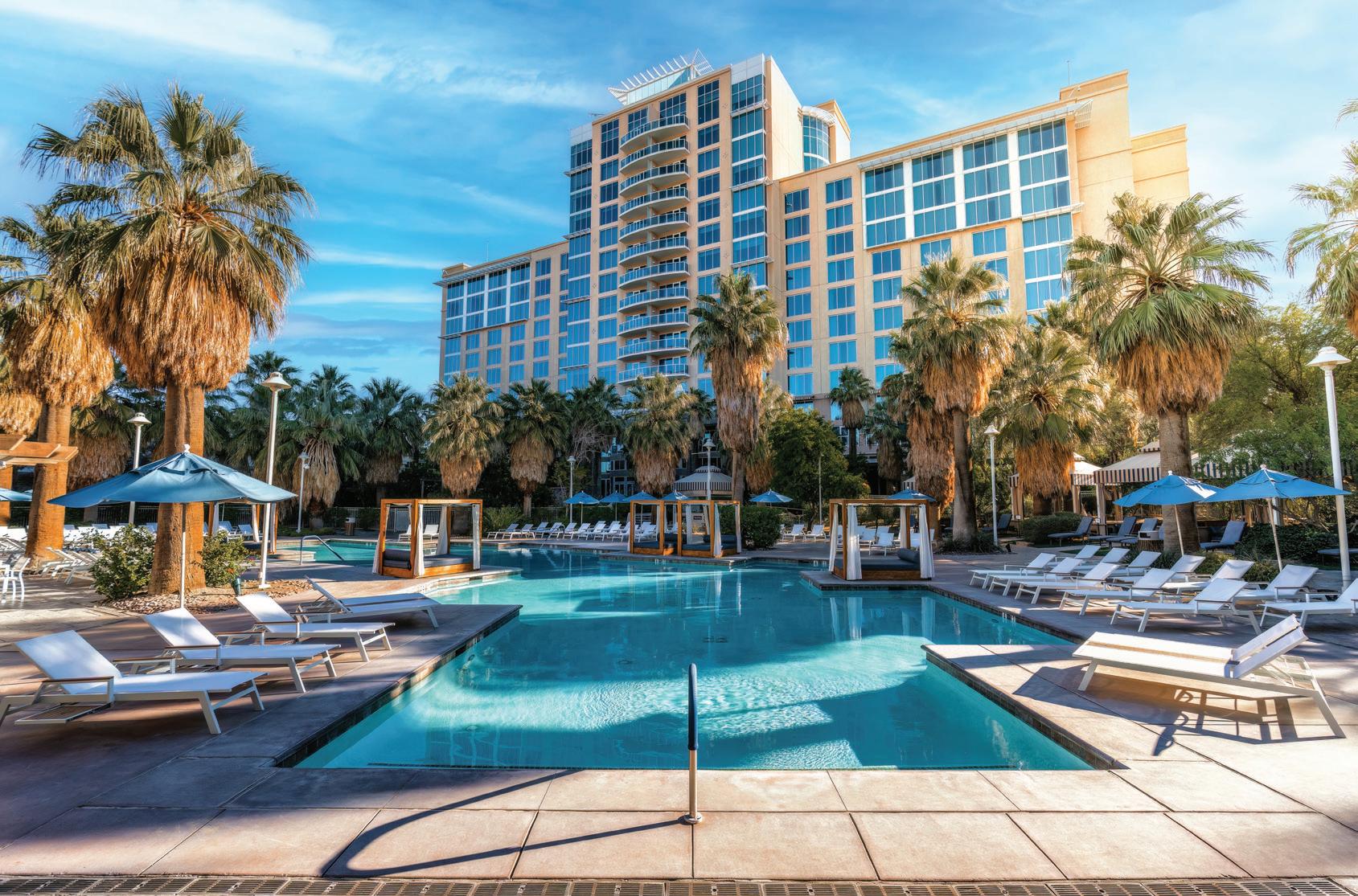
actively exploring several options in this area. One effective way to engage various generations is through sports. 360 Sports, located at all three locations, provides sports fans with an immersive viewing experience, showcasing their favorite games on screens throughout the sports bar. If sports wagering becomes available, this venue would serve as an excellent spot for both watching and betting, with mobile options likely also available.
As for online gaming, we will have to see how things develop, particularly in regard to Class II regulations. The current library of games is somewhat limited compared to Class III, but we hope to see it expand. If that happens, we could witness a broader implementation of these options throughout California and potentially other parts of the country.
Attracting younger customers requires more than just technological appeal. I cannot emphasize enough the importance of building relationships with younger customers. These individuals grow up and eventually become core customers over time — it’s a natural life cycle. Poker is a prime example; it gained popularity among college students who began playing online and eventually transitioned to real-life games. Observing this evolution, you’ll notice that
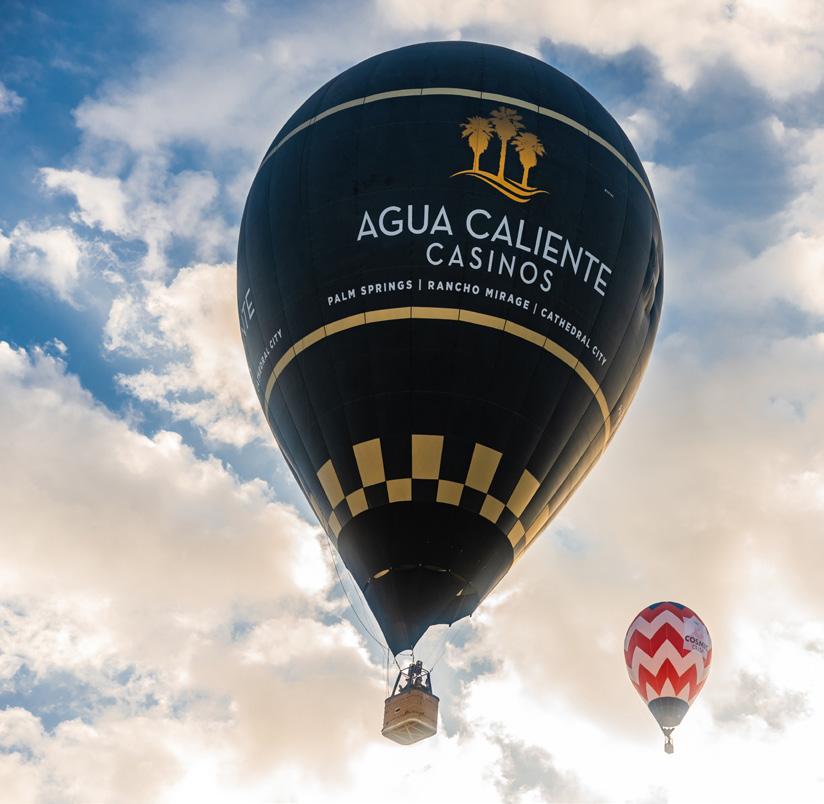
players often move from poker to live table games, and then to slot machines over the years.
With this in mind, we maintain a great poker room and offer a variety of wonderful table games, constantly introducing new options. Our recent expansion has also allowed us to add additional table games and the latest slot machines. All of these efforts are designed to appeal to guests of all generations.

Casino Life interviews Per Jaldung, CEO of Grand Casino Brussels Viage.
By Peter White
Fifteen years may not seem like much sometimes, but it’s an eternity in the casino industry. Think of all the upheavals that have come and gone in the world since Grand Casino Brussels Viage opened in 2010. Per Jaldung, the CEO is a seasoned veteran of the European gaming business. The honorary president of the European Casino Association since 2023, Jaldung is also a recipient of “Chief Executive of the Year” at the 2021 Global Gaming Awards. He spoke with Casino Life Publisher Peter White about his tenure at Viage, and what the casino means to its customers and employees.
Per, thank you for joining us. Let’s begin with a reflection. What does the 15th anniversary of Viage Brussels Casino mean to you, personally and professionally?
It means a great deal on both levels. Personally, it’s a moment of pride. Viage is not just a flagship
venue for our group, Casinos Austria International. It’s a place that embodies connection, consistency and commitment. I’ve had the privilege of seeing this project evolve and, even from a distance, I feel connected to the people behind it, many of whom have been part of the story since Day One.
Professionally, it’s a milestone that speaks volumes. Not only has Viage stood the test of time in a highly competitive and regulated industry, but it has also continued to reinvent itself while staying rooted in the heart of Brussels. That combination of resilience and renewal is what every casino should strive for.
When Viage opened in 2010, it brought a new vision for urban entertainment in Brussels. What was the original ambition for the venue and how has that evolved over the past 15 years?
The ambition was bold: to create a modern, urban entertainment hub that felt embedded in Brussels but connected to the world. We didn’t want to build
“just a casino.” We wanted a destination that blended gaming, culture, nightlife and hospitality under one roof.
Fifteen years later, I can say that Viage has exceeded that ambition. The venue has grown into a true icon, not only through its entertainment offering, but through its community engagement, diversity and strong partnerships in the city. Its success lies in staying relevant to Brussels, to guests and to our values as a group.
As CEO of Grand Casino Brussels Viage, what does your role involve on a day-to-day basis? How do you balance the strategic leadership of the casino with ensuring high standards in day-to-day operations?
As CEO, my role is about steering the long-term vision while staying close to what matters most: people and performance. I focus on growth, innovation, and ensuring VIAGE remains competitive, both in the Belgian market and in the wider European context. At the same time, I believe in being grounded. Operational excellence doesn’t come from policies alone; it comes from people feeling empowered and clear in their purpose. That’s why I work closely with the local management and teams. Strategy and daily standards go hand in hand.
A notable achievement for Viage is the number of team members who have remained with the casino since its opening. What do you believe has contributed to such strong staff retention over the past 15 years? How important is that continuity to the overall success and culture of the venue?
The fact that 86 people have stayed with Viage for 15 years says everything. It reflects a workplace culture where people feel respected, challenged and part of something meaningful. We invest in our people but, more importantly, we listen to them. There’s a shared sense of pride and a human approach that makes Viage not just a place of work but a part of people’s lives. That continuity is gold. It means experience, trust and consistency for our guests. It builds a culture where new team members learn from those who’ve lived the values for years.
Viage has become more than just a casino. It’s a landmark in Brussels. What do you see as the key factors behind its sustained success and
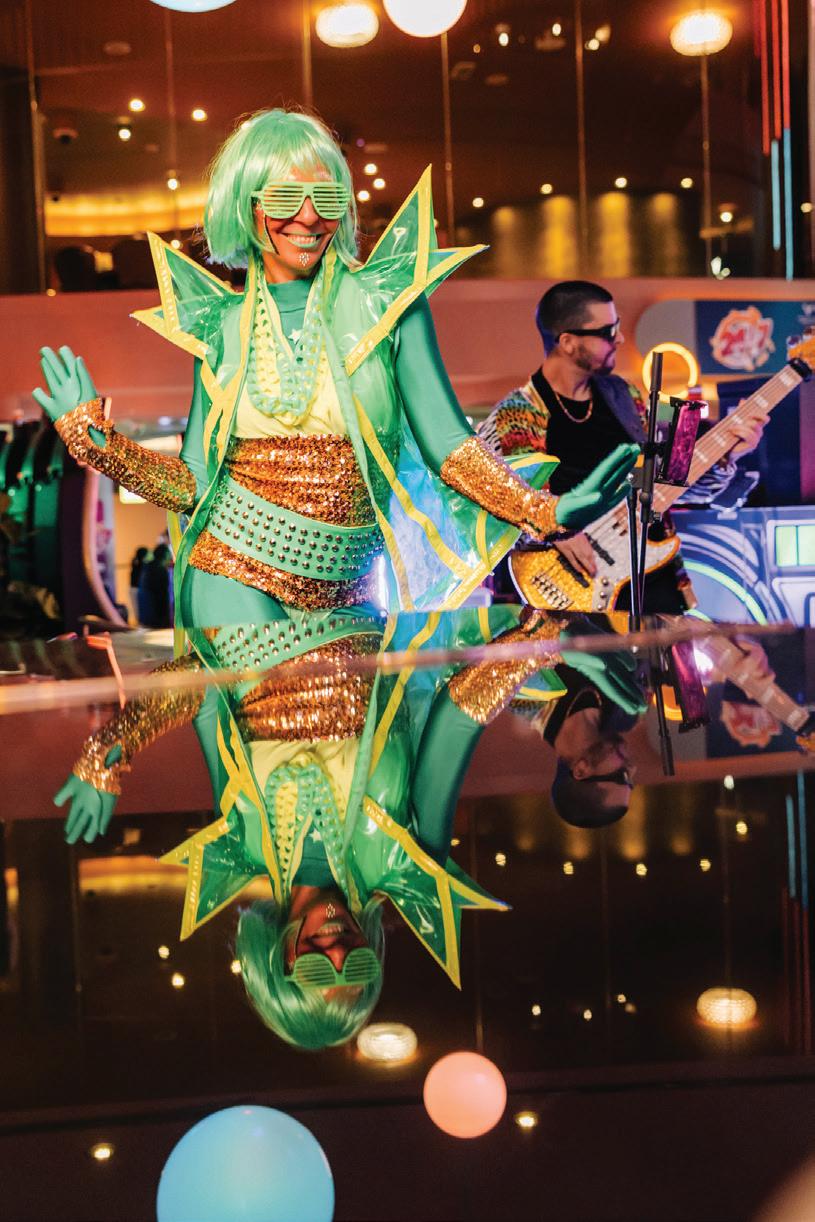
popularity?
I believe it’s the combination of three things. First, local roots. Viage feels like Brussels. It’s located in the heart of the city, works with local artisans and businesses, and is active in community life. There is the international perspective. The venue attracts a diverse clientele, and offers a level of service and experience that speaks to global standards. Finally, there is the cultural mix. Whether it’s poker tournaments, dinner shows, concerts or exhibitions, Viage creates reasons for people to return and feel at home. The result is loyalty. Guests feel welcome, understood and part of the energy. That’s the real magic.
How has Viage adapted to the changing landscape of land-based gaming, particularly in response to digital transformation and evolving customer expectations?
The gaming world is changing rapidly but the core desire remains the same: People want experiences that feel safe, exciting and personal. Viage has adapted by diversifying its offer, training its staff to be more customer-focused than ever and integrating
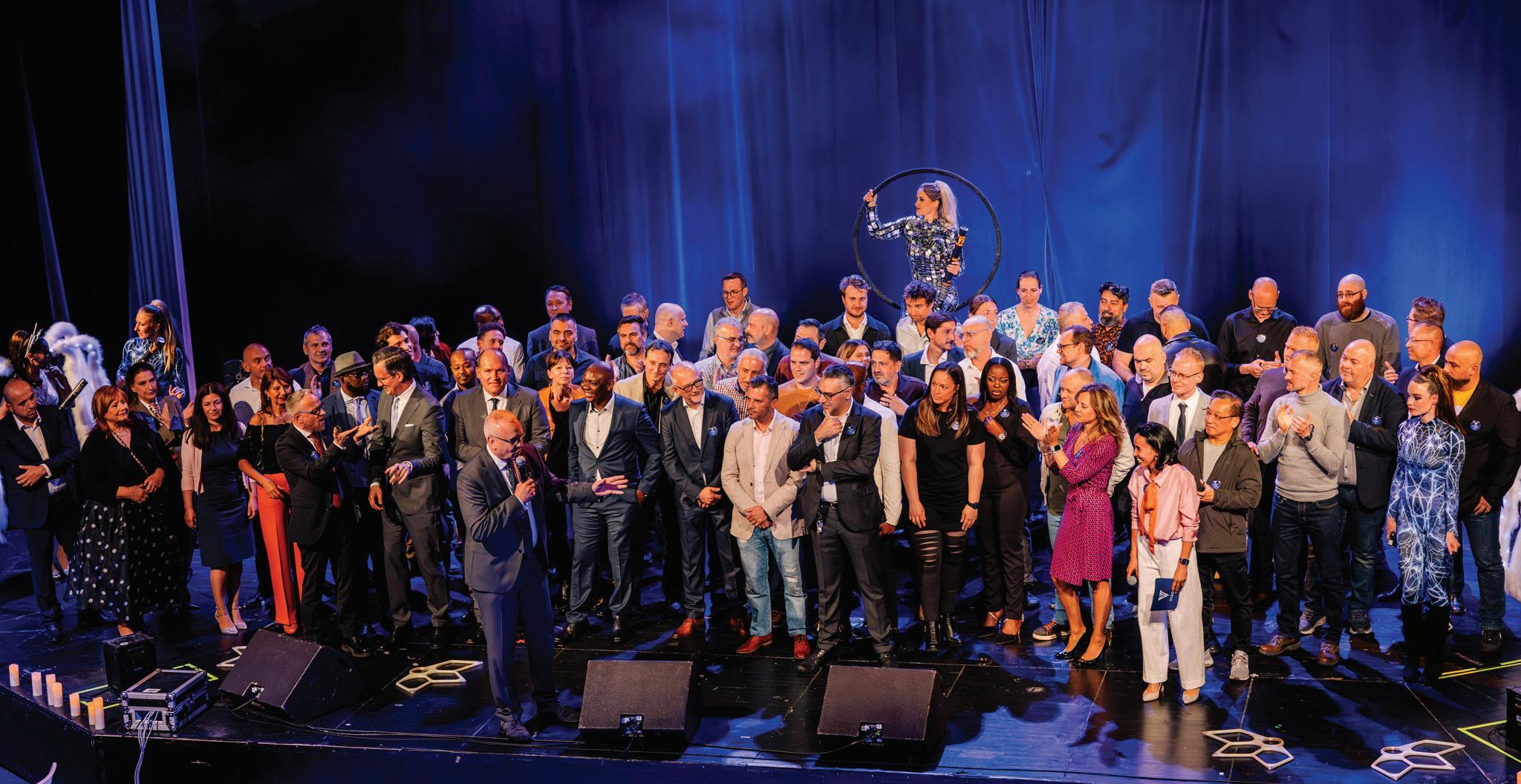
technology where it adds value, not noise. We’ve also leaned into storytelling and emotional connection. Through our branding, entertainment and even responsible-gaming initiatives, we make sure the experience is not just about playing – but about belonging.
The entertainment offering at Viage is multifaceted – gaming, dining, live shows and events. How important has this integrated model been in shaping the venue’s identity?
It’s been absolutely essential. From the beginning, we wanted Viage to feel like more than a casino – a full entertainment center where everyone could find something for themselves. Whether you're coming for a poker tournament, a live ABBA dinner show or simply a good glass of wine with friends, the goal is to offer a complete experience.
That integrated model allows us to stay flexible and relevant. It also brings together different audiences: locals, tourists, business groups, all under one roof. This mix has become part of Viage’s identity: open, dynamic and welcoming to all.
Looking at Viage's role within the local community, how has the casino engaged with the city of Brussels culturally and economically over the years?
Viage is very much a part of Brussels, geographically, culturally and socially. We’ve built strong, long-term partnerships with institutions like Brussels Major
the
and creators.
Economically, we employ over 275 people, with 70 percent living in Brussels. We’ve invested more than €46 million in the venue since opening and contribute around €24 million per year to society through taxes, levies and economic spin-offs. Culturally, we’ve made our space available for everything from study hall, art expos to film shoots to public city events. We’re not just in the city, we act for the city.
From your perspective, how does Viage compare to other leading casinos across Europe in terms of innovation and best practices?
Viage stands out because it balances innovation with authenticity. Many venues either over-modernise or cling too tightly to tradition. We aim for a third way, rooted in real hospitality but always pushing forward. From launching Belgium’s first in-house croupier training school to being the only Belgian casino with responsible-gaming certification from the European Casino Association, we don’t follow trends, we set standards. We also recently became the first casino in the world to receive the Queer Destination label, in collaboration with Visit Brussels. That’s a statement of values and of leadership.
Sustainability and corporate responsibility are growing priorities in the industry. How is Viage addressing these areas as it plans for the future? Sustainability isn’t a trend for us, it’s a commitment.
In the past year, we’ve launched a structured ESG roadmap, focused on environmental impact, team well-being and responsible sourcing. We achieved the EcoVadis Silver Certification in record time, placing Viage in the top seven percent of all companies assessed globally and the only casino in Belgium with that recognition. But we’re not stopping there. We’re already asking the next question: How do we reach gold? That’s the Viage mindset – we celebrate success but we don’t settle.
Viage attracts a diverse, international clientele. How has the team cultivated an experience that appeals to both local guests and global visitors?
We’ve built a team that reflects our audience: multilingual, multicultural and emotionally intelligent. The goal is always to make people feel seen and welcomed, whether they live down the street or have just landed at the airport. We train our staff more and more. It’s not about scripts, it’s about understanding people’s expectations and exceeding them in human ways. Our entertainment mix also helps with everything from live DJ sets to themed events and world-class poker events. We make sure there’s something that speaks to every guest, in every language.
The casino sector has faced considerable challenges in recent years, from regulatory changes to the impact of the pandemic. What lessons has Viage drawn from these experiences? The biggest lesson? Resilience is built in advance. When the pandemic hit, we were able to rely on strong internal culture, trusted local relationships and transparent communication. We also learned to innovate faster, to pivot our offers, rethink our spaces and stay close to our guests even when the doors were closed. Those challenges didn’t break us, they sharpened us. We came out of it stronger, more connected and even more focused on what really matters: people, safety and purpose.
Responsible gaming remains a cornerstone of modern casino operations. Can you share how Viage has strengthened its responsible-gaming framework in recent years?
We take our responsibility to players and to society extremely seriously. At Viage, responsible gaming isn’t just a department; it’s a culture. Every team member
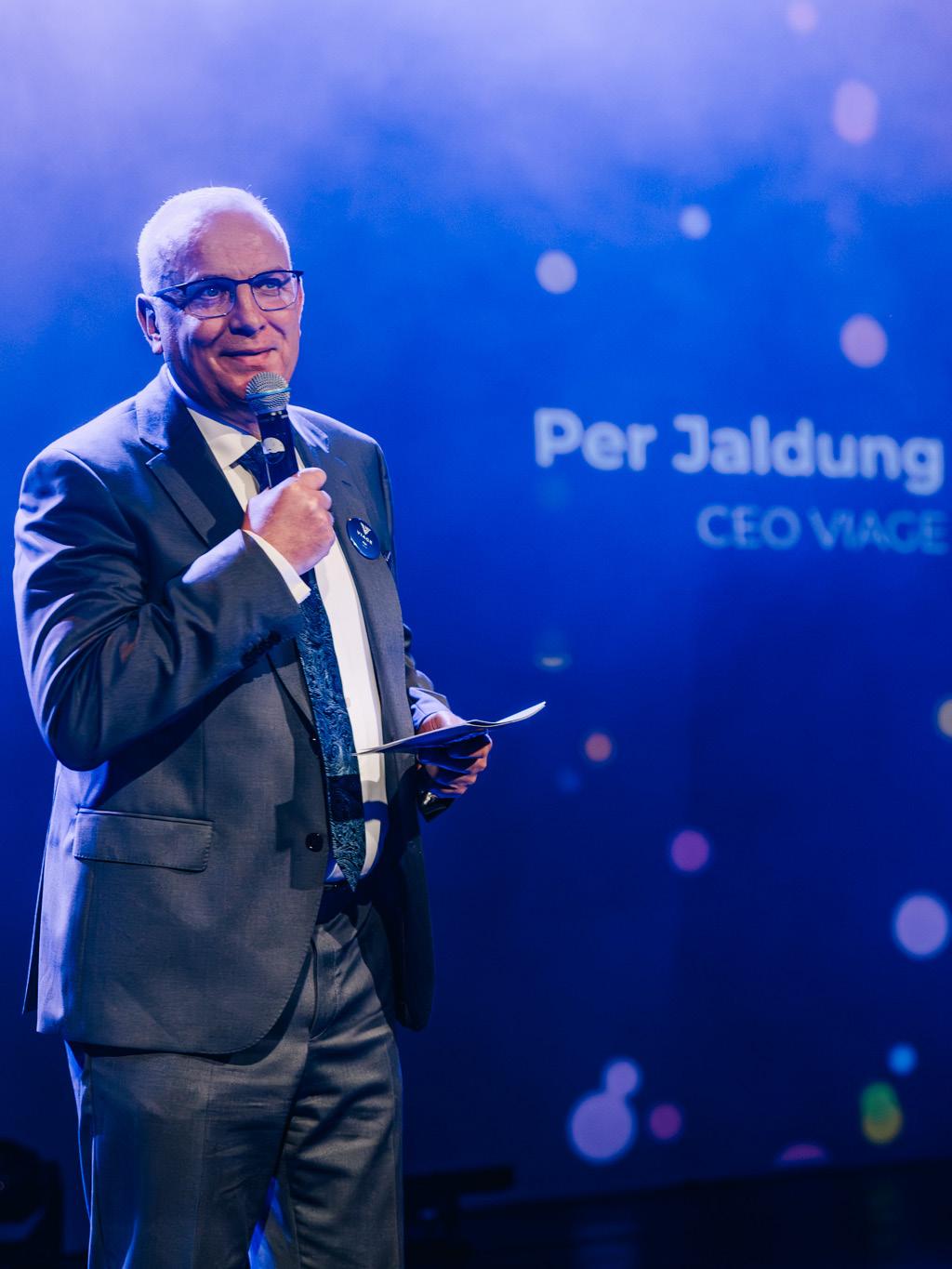
receives training, from the front line to leadership, to ensure early intervention, respectful communication and informed guidance.
We’re proud to be the only casino in Belgium certified by the European Casino Association for Responsible Gaming. It’s not just a label, it’s a reflection of the way we operate: transparent, ethical and always guest-focused. We’ve also invested in tools and partnerships that help us stay ahead of best practices, ensuring that entertainment never comes at the expense of well-being.
Staff retention and training are key to delivering a quality customer experience. What strategies has Viage employed to build and sustain a strong team culture?
We’ve always believed that if you take care of your people, they’ll take care of your guests. That’s been at the heart of our strategy for building a strong team culture. We invest not only in skills, but in personal growth. New hires are supported through structured onboarding and cross-departmental learning. At the same time, we actively promote from within giving our team members real career paths inside the business.
Many of our colleagues started in entry-level roles and have since grown into management or specialist
positions. That kind of upward mobility sends a clear message: When you commit to Viage, Viage commits to you. This long-term, people-first approach has helped us maintain continuity, team spirit and a strong sense of purpose, all of which directly impact the guest experience.
With 15 years of achievement behind you, what are some of the upcoming developments or projects we can expect from Viage in the near future?
We’re already preparing for what’s next. Our goal is to further elevate the Viage rooftop experience with seasonal pop-ups that bring in new audiences. We’re also expanding our partnerships with local cultural institutions (from art exhibitions to music nights), ensuring that VIAGE remains a hub for creativity in Brussels.
On the operational side, we’re continuously updating and expanding our gaming offer, refining our digital tools and preparing for new environmental benchmarks as we set our sights on EcoVadis Gold Certification. Whatever we do next, it will be done with the same spirit: deeply rooted in Brussels and boldly looking forward.
In your opinion, what does the future hold for the land-based casino sector in Europe – and how is Viage positioning itself within that vision?
The future of land-based casinos isn’t about resisting change, it’s about embracing purpose. Casinos will need to be more than gaming floors: They’ll be entertainment centers, cultural venues and social spaces. Viage is already there. We’ve shown that a casino can offer world-class gaming and local storytelling, international standards and deep community ties. We’re investing in sustainability, inclusivity and experience design, because we know that guests don’t just want to play; they want to feel something.
Lastly, the future of the land-based casino industry is also very dependent on its regulatory frameworks. We need a fair and reasonable regulatory environment to operate in. It needs to be predictable as well. In some jurisdictions, overly rigid and far-reaching regulatory ambitions have killed the licensed, legal operations. This is giving up the market to organized crime and illegal gambling offers. There needs to be a balance and regulatory decisions should be based on risk and science. The land-based casino will thrive
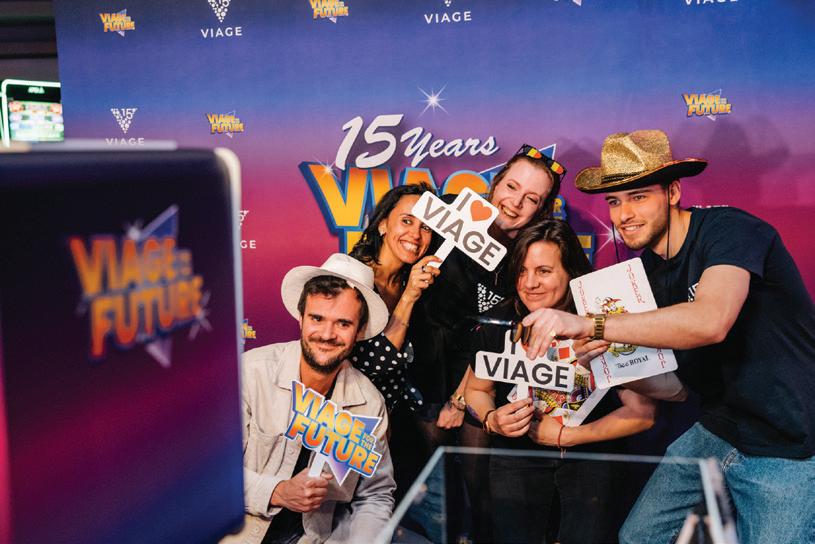


if it remains human, responsible, rooted in place and focused on the customers. That’s Viage’s blueprint.
Lastly, what message would you like to share with your guests, staff and partners as Viage celebrates this important anniversary?
Thank you. To our staff for your loyalty, heart and excellence. To our partners for believing in our journey and growing with us. And to our guests for trusting us, for returning and for making Viage what it is. Fifteen years is a milestone. But it’s also a beginning. We’re proud of what we’ve built – and excited for what comes next. From the heart of Brussels, with gratitude and ambition, we say: Here’s to the next chapter.
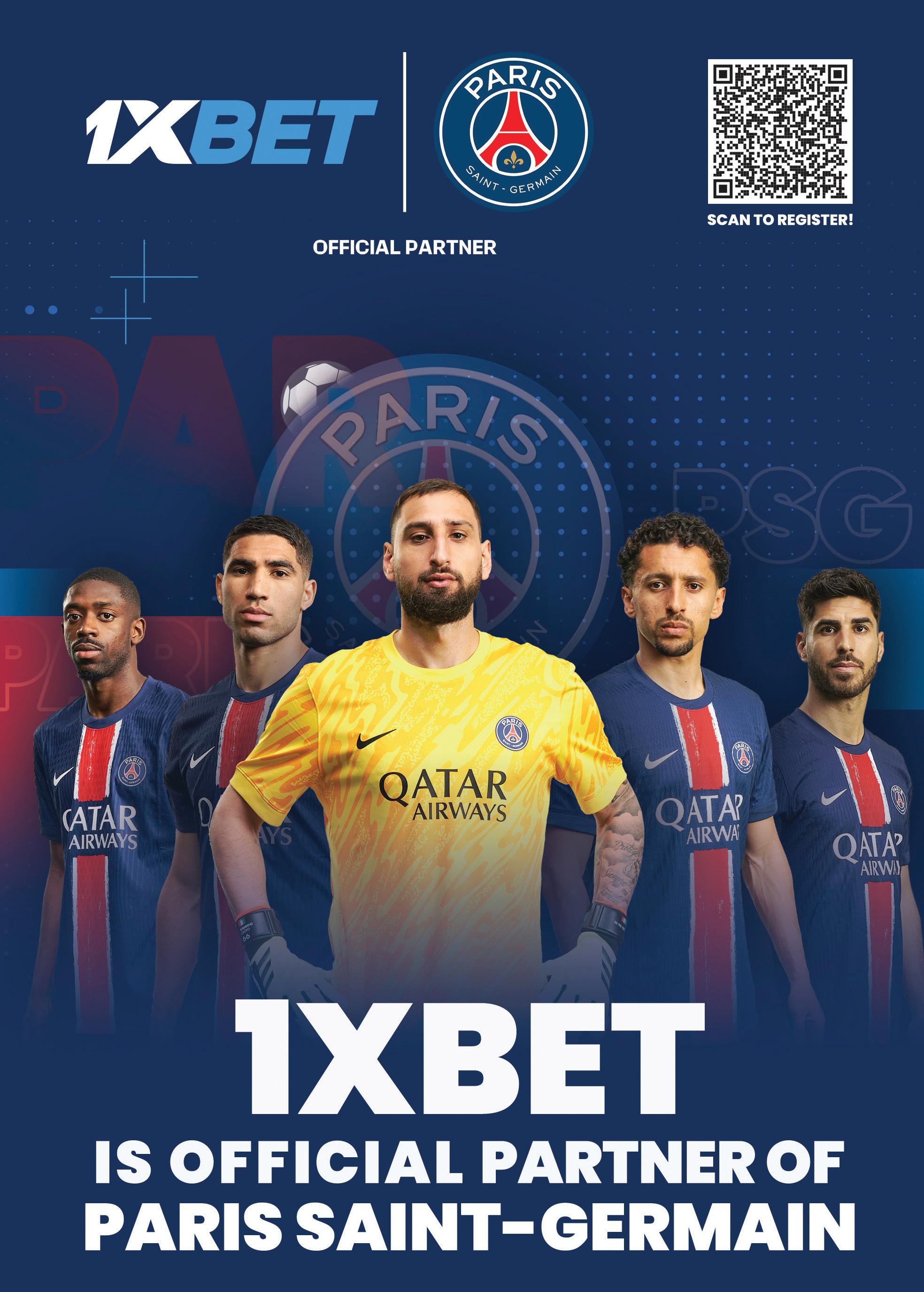
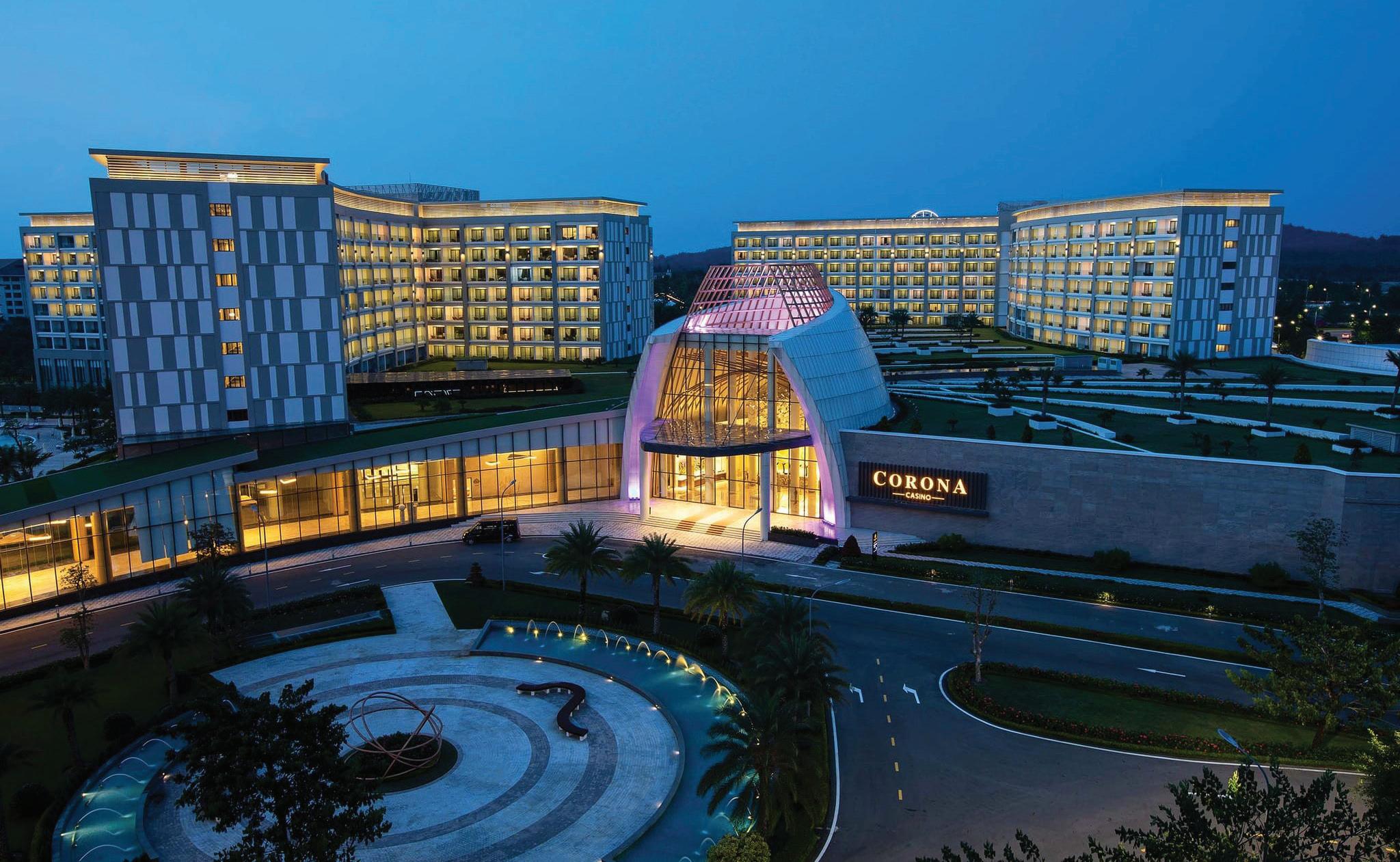
The evolution of gaming legislation in Vietnam. By Shaun McCamley
ietnam’s journey with casino-gaming legislation has been marked by cautious experimentation, significant foreign investment and evolving regulatory frameworks. As of May 2025, the nation’s approach reflects a balance between economic aspirations and social considerations. This article delves into the historical context, current landscape and future prospects of casino gaming legislation in Vietnam, and how the country’s unique political structure plays a pivotal role in shaping gaming policy.
Historically, gambling in Vietnam was largely prohibited, with only state-run lotteries being legal. The government viewed gambling as a vice that threatened the moral fabric of society. However, as neighboring countries like Cambodia, the Philippines and Macao began reaping the economic benefits of integrated resorts and gaming revenues, Vietnam faced increasing pressure to liberalize its stance.
Before 2017, Vietnamese citizens were banned from entering casinos. Foreigners could gamble at certain locations but locals were strictly excluded, a policy that inadvertently fueled the growth of illegal gambling dens and capital outflows to neighboring countries where Vietnamese could gamble openly.
The issuance of Decree No. 03/2017/ND-CP marked a legislative breakthrough. The decree launched a three-year pilot program, allowing eligible Vietnamese citizens to gamble in approved casinos. This was complemented by Decree No. 06/2017/NDCP, which legalized betting on international football matches, horse racing and greyhound racing under strict regulations.
To qualify, Vietnamese gamblers needed to be over 21, have a monthly income of at least VND10 million (US$400) and pay an entry fee. Casinos were required to report participant data to the Ministry of Finance and local authorities, with comprehensive socialimpact assessments mandated.
The first and only venue to participate in the pilot program was the Corona Resort & Casino, on Phu Quoc Island. Opened in 2019, it became the focal point of the government’s experiment in liberalizing local access to gaming. Despite initial skepticism, the program reportedly attracted thousands of local players, generating significant tax revenues and creating jobs. Nevertheless, industry insiders shared a contrasting perspective, highlighting that the property struggles to meet its revenue targets and faces several challenges that impede its ability to generate income.
Concerns about transparency and accountability have continued to exist. The absence of independent audits and the limited disclosure of social-impact assessments have led to doubts regarding the sustainable expansion of access on a national scale.
To understand the evolution of casino gaming legislation in Vietnam, it is essential to grasp the workings of the country’s political structure. Vietnam is a one-party, socialist republic governed by the Communist Party of Vietnam (CPV). The three main pillars of authority are:
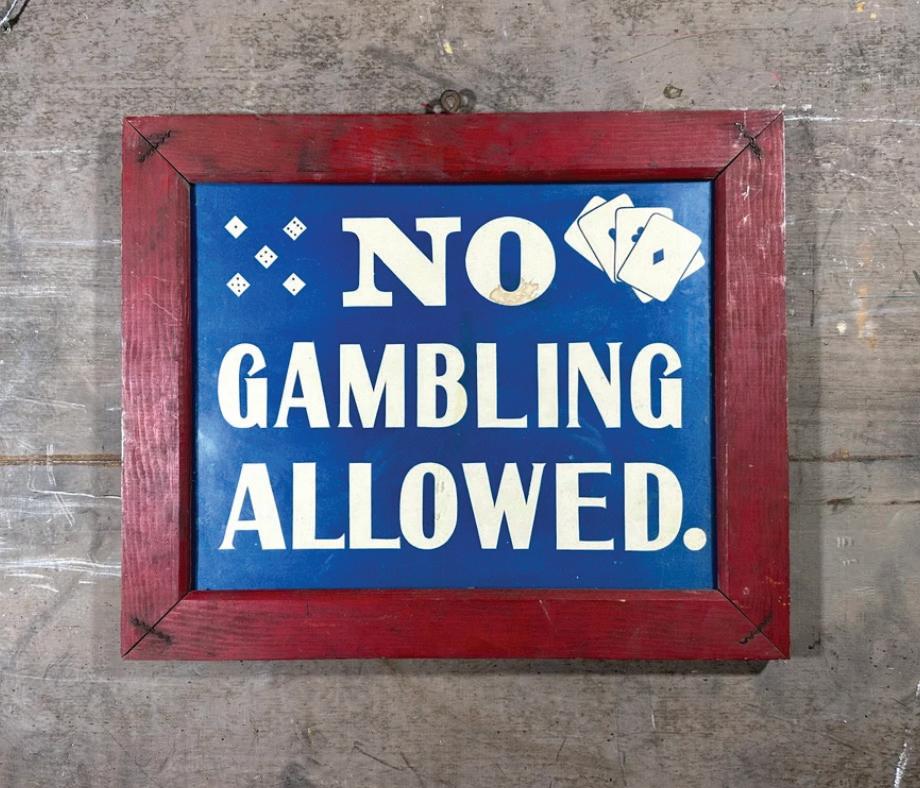
prime minister can also issue executive decrees, like those enabling the 2017 pilot program.
The Politburo stands as the top decision-making body in Vietnam, comprising approximately 18 to 20 senior members of the CPV. This influential group sets policy direction and oversees the implementation of laws across the country. Decisions made by the Politburo significantly shape economic development strategies and play a crucial role in determining whether sectors such as gaming will be expanded. Key members of the Politburo often lead or have a say in national steering committees that oversee sensitive areas like finance, security and public health.
The president of Vietnam acts as the ceremonial head of state and commander-in-chief of the armed forces. However, real executive power lies with the prime minister, who heads the central government and oversees ministries. The Office of the Prime Minister plays a central role in implementing policy. When the Ministry of Finance or Ministry of Planning & Investment develops proposals related to the gaming industry, they must be reviewed by the prime minister’s office before proceeding to the National Assembly or receiving cabinet-level approval. The
Though the National Assembly is Vietnam’s legislative body, its role is often one of formalizing rather than initiating policy. Members of the Politburo, including the prime minister and president, typically guide legislative agendas. Bills are drafted and reviewed through a consultative process involving ministries, the Communist Party and industry stakeholders, then are passed by the National Assembly.
Vietnam’s casino industry has seen notable growth since the launch of the pilot program. Several integrated resorts have emerged as high-profile destinations, primarily serving foreign tourists and expatriates. Yet the regulatory environment remains cautious and fragmented.
Vietnam currently hosts over eight licensed casinos, primarily in tourist destinations like Da Nang, Quang Nam and Phu Quoc. Notable developments include:
Hoiana Resort & Golf (Quang Nam): Owned, developed and operated by Hoi An South Development Ltd. (HASD), this integrated resort opened in 2020. It features luxury hotels, golf courses
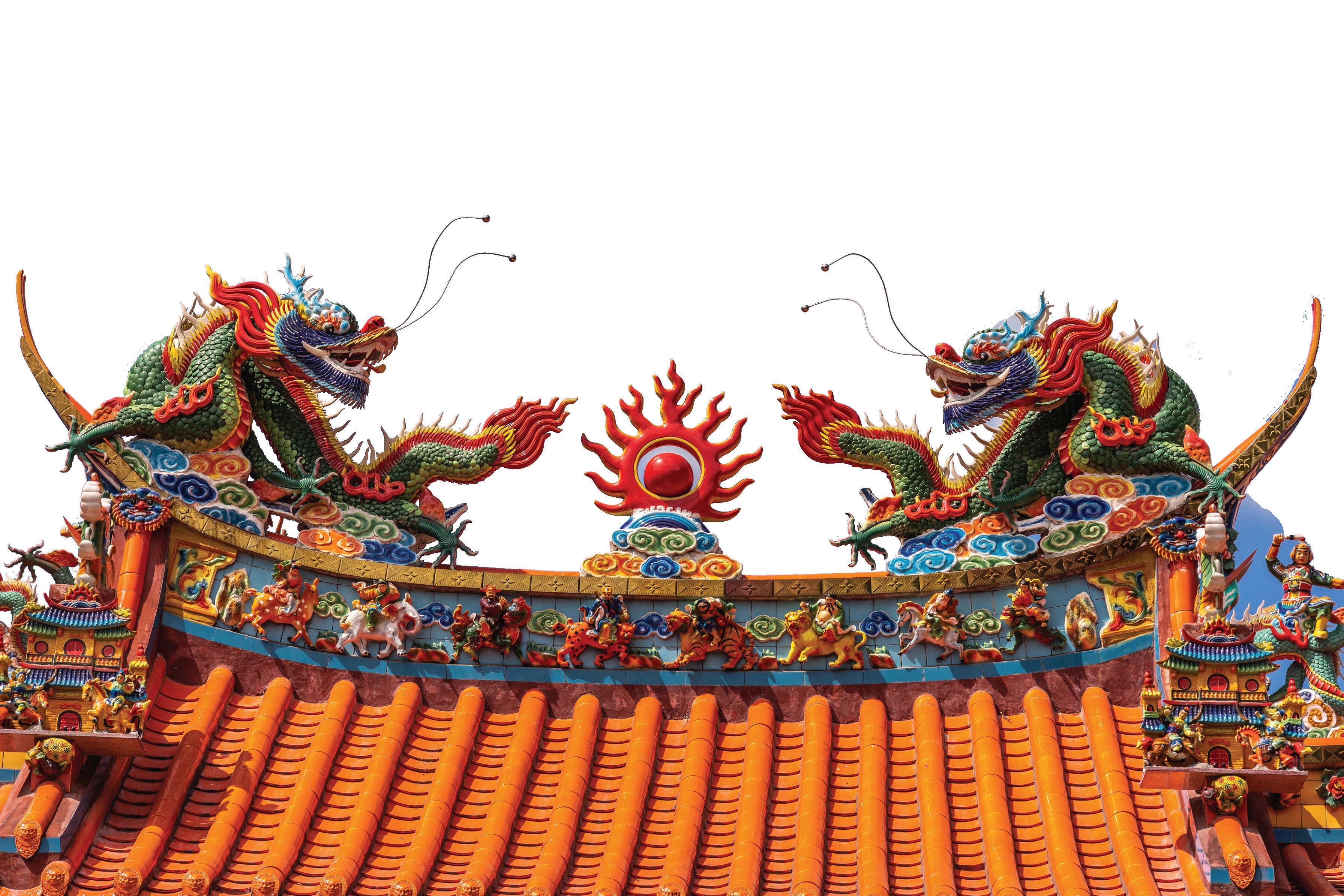
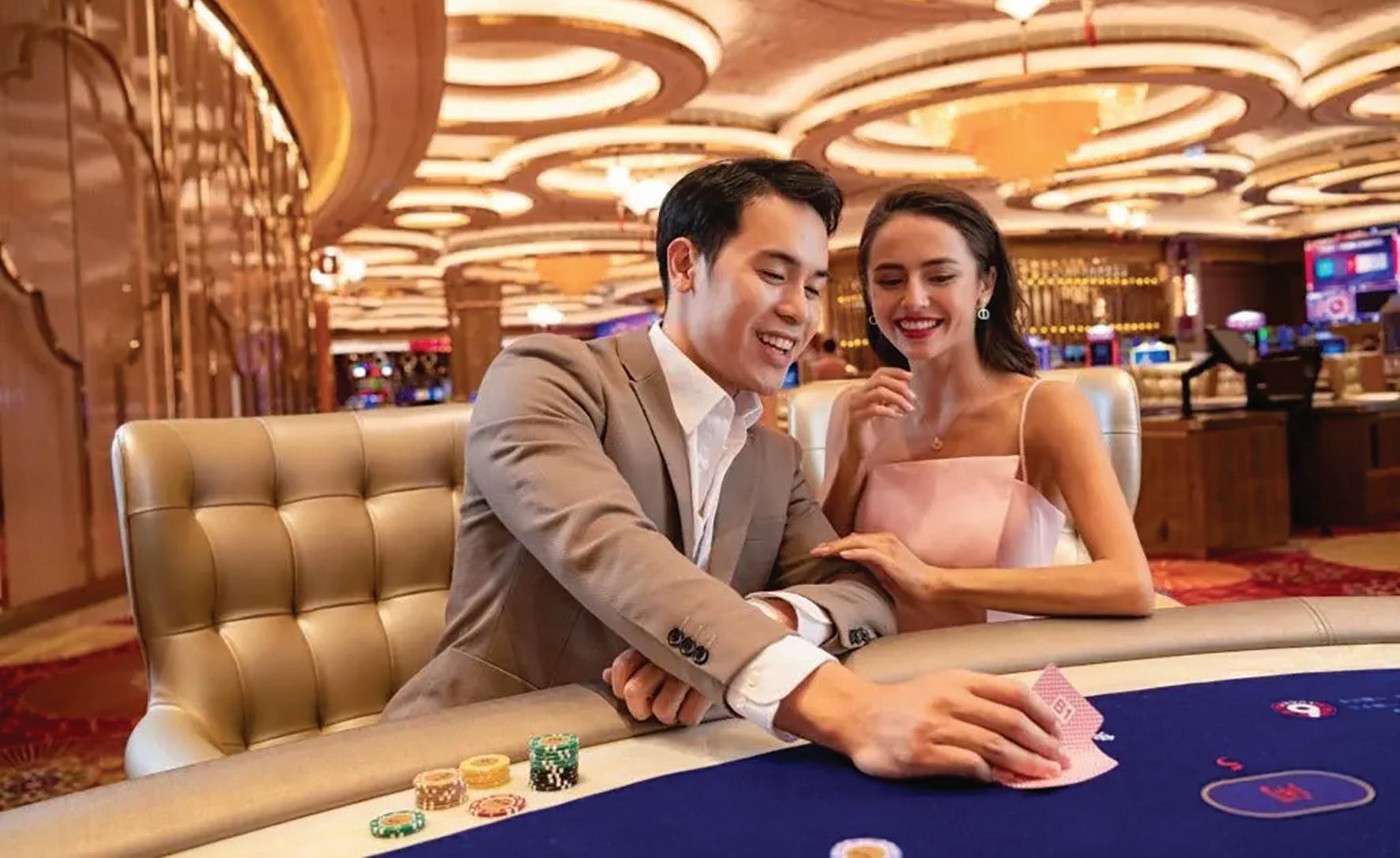
and a gaming floor. Hoiana recently announced a $1 billion expansion to enhance its non-gaming attractions.
Grand Ho Tram Strip (Ba Ria-Vung Tau): One of the earliest integrated resorts, Ho Tram continues to expand with new hotel brands and entertainment offerings. It remains a key case study in foreign investment under Vietnam’s gaming policy.
Van Don Casino Project (Quang Ninh): Touted as a flagship investment in a planned special economic zone, this project has been slow to materialize due to regulatory bottlenecks and strategic uncertainty.
Vietnam lacks a unified gaming law. Instead, the industry is regulated through decrees issued by the prime minister, guidance from the Ministry of Finance, and various local-level approvals. This fragmented framework creates confusion and slows development. For example, approval for new casino projects requires multiple layers of consent: provincial approval, ministry-level evaluation and final ratification by the prime minister. The absence of a national gaming commission further complicates enforcement and coordination.
As of early 2025, Vietnam’s pilot program allowing local citizens to gamble at Corona Casino (Phú Quốc) remains suspended. The trial ended on December 31, 2024 and Vietnamese nationals have not been allowed to gamble at the casino since January 1, 2025, pending a government decision on whether to renew or terminate the scheme. No official announcement has yet reinstated the program or permanently ended it, meaning it is effectively on hold under the law until further notice. The Ministry of Finance is currently leading this assessment, which is expected to shape future policy decisions.
The future of casino gaming in Vietnam is delicately poised. While economic arguments for expanding the sector are strong, political caution and societal concerns continue to influence policymaking.
Pending Review and Policy Recommendations
The government is expected to publish a comprehensive report in late 2025 reviewing the pilot program’s impact. Early indicators suggest that the program may be extended, potentially with tighter regulatory controls and enhanced transparency. Recommendations may include:
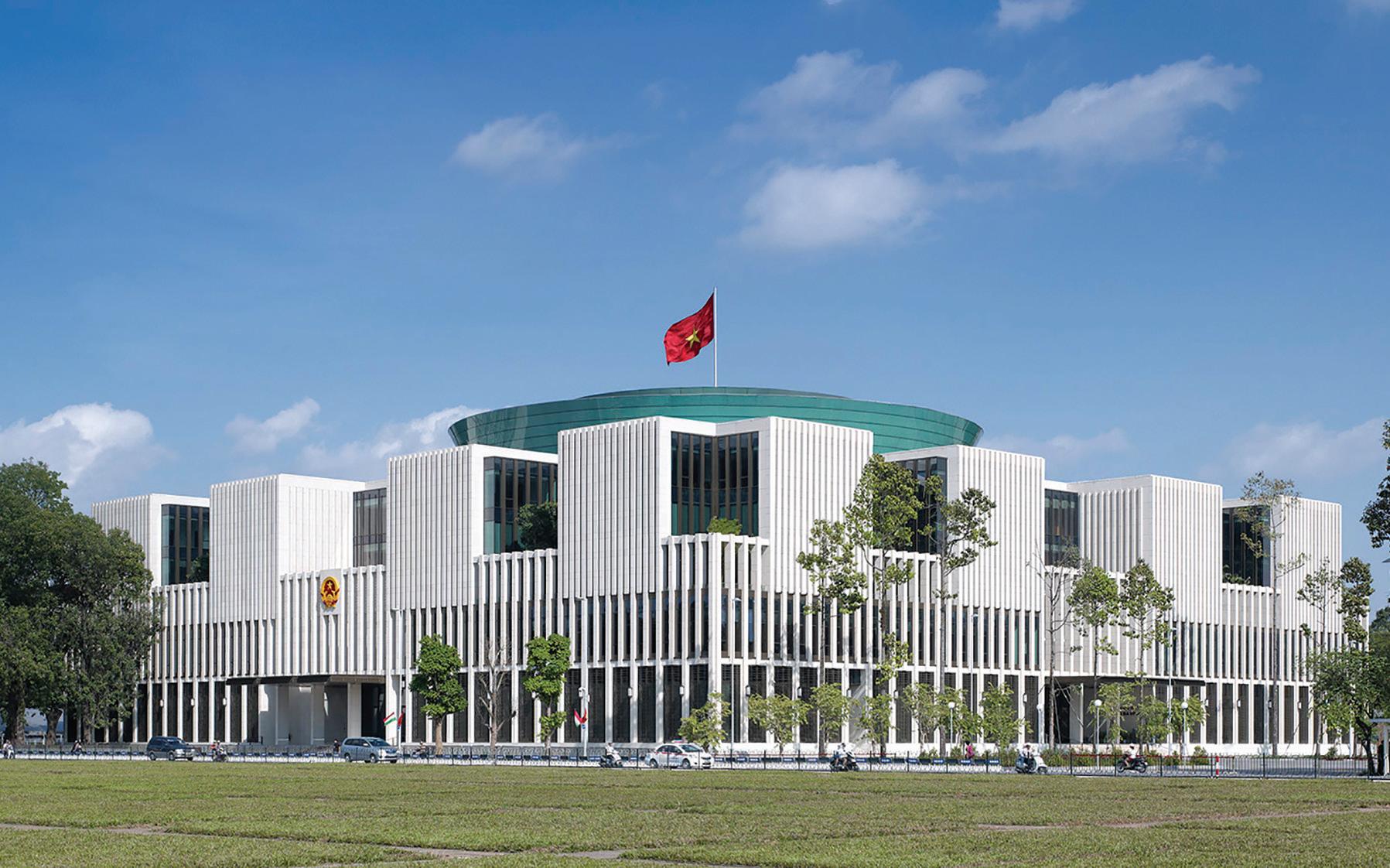

• Expanding local access to multiple casinos under strict conditions
• Establishing a national gaming authority for oversight
• Introducing electronic monitoring systems to track player behavior
• Mandating third-party audits and publishing annual impact reports
Vietnam's cautious approach contrasts with neighboring jurisdictions such as Cambodia and the Philippines, where gaming legislation is more
liberal and investor-friendly. To remain competitive and attract regional tourism, Vietnam may need to modernize its gaming laws and regulatory practices.
Vietnam's digital entertainment sector has experienced significant growth, particularly in online gaming. While the government has implemented stringent regulations on online gambling, social gaming has emerged as a thriving segment, operating within a distinct regulatory framework.
Online gambling, especially casino-style and cardbased games, is officially prohibited in Vietnam. Decree 147, effective from December 25, 2024, enforces this ban and introduces strict measures to prevent unlicensed gaming activities. The decree mandates:
• Ban on Casino-Style and Card-Based Games: These games are ineligible for licensing, aiming to mitigate potential social harms.
• Enhanced Player Verification: All players must verify their identities using Vietnamese mobilephone numbers.
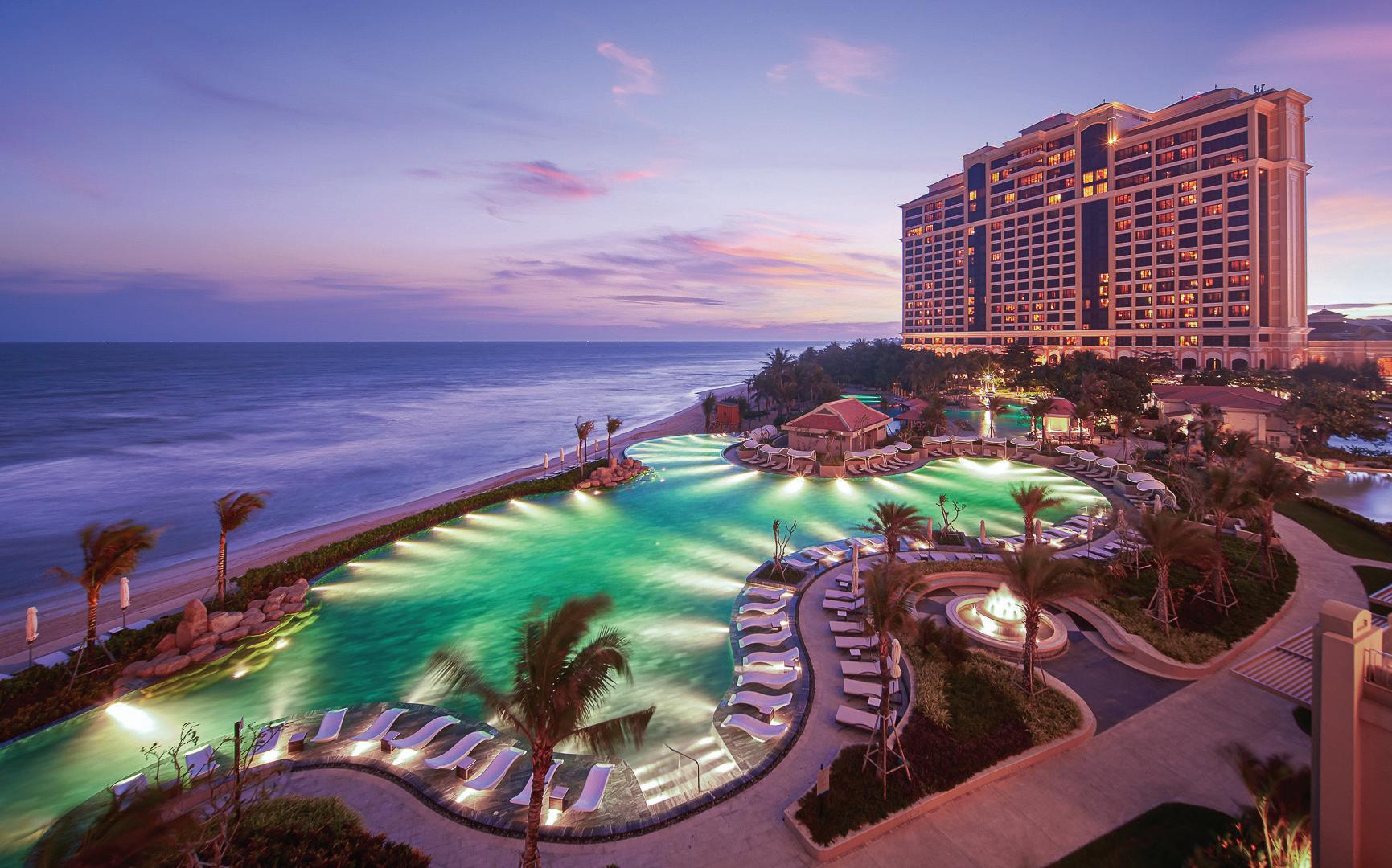
• Protection for Minors: Players under 16 require parental or guardian information during registration, with gameplay time restrictions for those under 18.
• Compliance for Cross-Border Operators: Foreign gaming companies must establish local operations and adhere to Vietnam’s payment regulations.
These measures reflect the government's commitment to curbing illegal online gambling and protecting vulnerable populations.
In contrast to online gambling, social gaming – games played primarily for entertainment without monetary rewards – has seen substantial growth in Vietnam. This segment includes puzzle games, strategy games and multiplayer online battle arenas (MOBAs). Social gaming operates under a different regulatory framework:
• Licensing and Oversight: Local Departments of Information & Communications (DICs) are responsible for certifying G2, G3 and G4 games, which encompass most social games.
• Content and Age Restrictions: Games must

adhere to content guidelines. Developers are required to implement age-appropriate features, including parental controls.
• Market Growth: The social gaming market in Vietnam is expanding, driven by increased smartphone penetration and a young, tech-savvy population.
The government’s supportive stance towards social gaming, coupled with clear regulations, has fostered an environment conducive to innovation and growth in this sector.
Vietnam’s approach to online gaming distinguishes

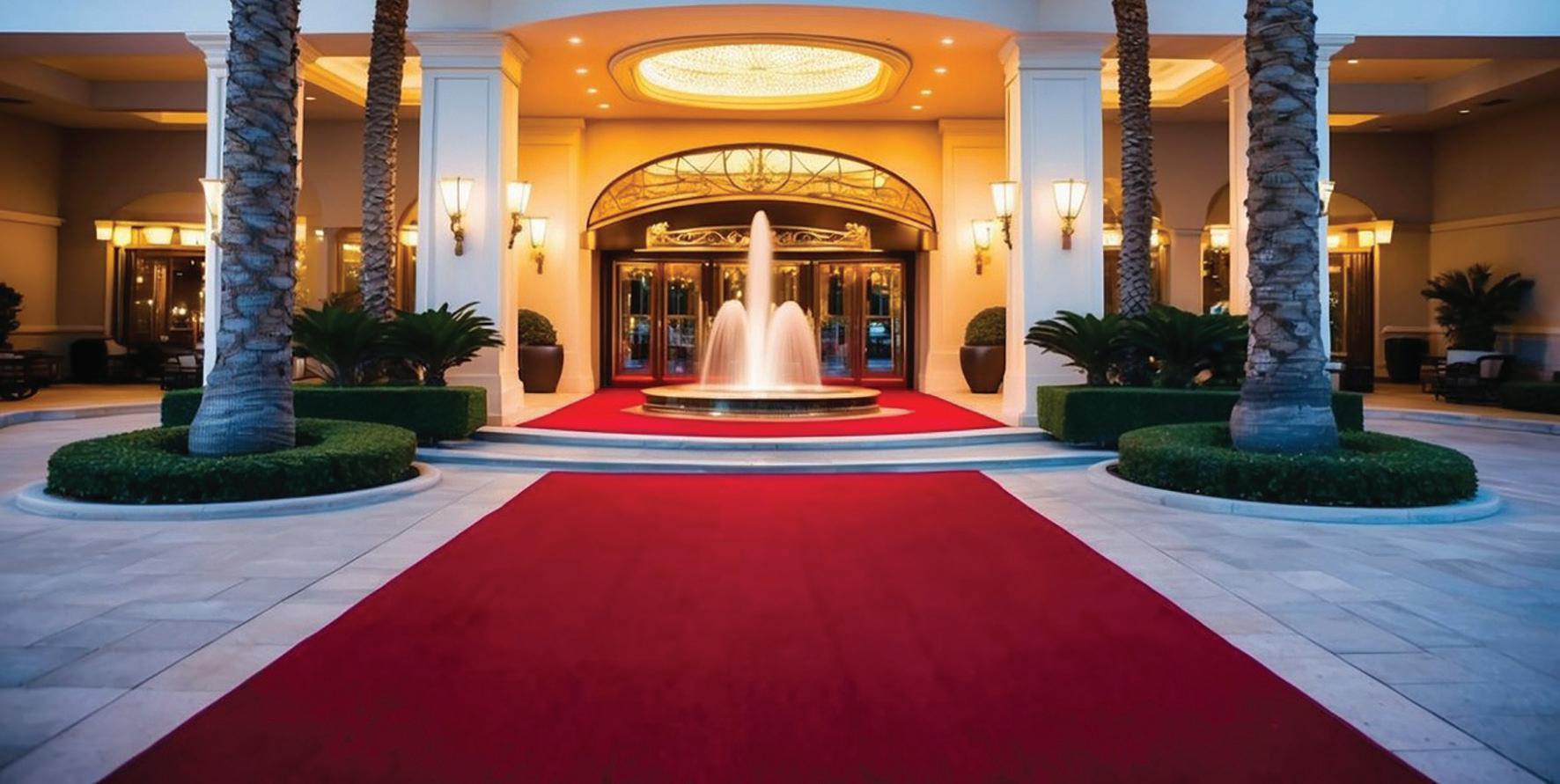
between gambling and social gaming, enforcing strict regulations on the former while promoting the latter. This delineation ensures consumer protection and aligns with the country’s cultural and social values. As the digital entertainment landscape continues to evolve, Vietnam’s regulatory framework will play a crucial role in shaping the industry’s future trajectory.
Casino gaming is increasingly being integrated into Vietnam’s broader economic development plans, especially in special economic zones. Policymakers view integrated resorts as tools to stimulate infrastructure development, create jobs and generate tourism revenues.
There is growing support among provincial leaders for expanded gaming rights, especially in coastal provinces like Khanh Hoa, Da Nang and Ba Ria-Vung Tau. However, such initiatives require national-level endorsement, reinforcing the importance of the Politburo and of prime ministerial backing.
Vietnam’s evolution in casino gaming legislation reflects the broader balancing act of economic liberalization within a tightly controlled political system. The Politburo and Office of the Prime Minister remain central to shaping policy direction, while ministries and provincial authorities execute development strategies. The pilot program for local gamblers was a bold

step that yielded economic and employment benefits. Yet the suspension in late 2024 underscores the government’s commitment to measured, data-driven policy. Future legislation will likely depend on the results of ongoing evaluations and the political will of senior leaders to embrace more liberal reforms.
With a population of nearly 100 million and a growing middle class, Vietnam represents a significant opportunity for gaming investors. However, only those prepared to navigate the complexities of its political and regulatory environment will succeed.
As a 40-year veteran in the Southeast Asian gaming industry and former president of Ho Tram Resort Casino, I believe that Vietnam stands on the threshold of transformative growth. The next decade will determine whether the country can become a regional leader in integrated resort development or remain a cautious participant on the sidelines of Asia’s gaming boom.

The bear’s casino industry, despite all odds, shows no signs of slowing. By Eugene Gerden
ussia’s casino sector shows positive dynamics this year. Western sanctions did not lead to a significant deterioration of the situation in the industry nor a massive exodus of gamblers. Last year also became successful for the industry, as the number of visitors of gambling zones in Russia grew by 10 percent in 2024, compared to 2023, and exceeded 2.1 million people. Since 2009, casino activities in Russia have been legal only within special territories – gambling zones. Such measures were taken by the state due to a widespread spread of gambling, multi-billion-dollar casino turnover and the growing number of gamblers in Russia at the beginning of 2000s. At present,
Rthere are four operating gambling zones in Russia: Krasnaya Polyana, Sibirskaya Moneta, Primorye and Yantarnaya.
According to data of the Russian Association of Operators of the Entertainment and Event Tourism Industry (AIRIS, which unites all four existing gambling zones in the country), last year the Krasnaya Polyana gambling zone became a leading gambling zone in the country in terms of the number of visitors, which exceeded more than 907,000 people. At the same time, the best growth dynamics were observed in the Siberian Coin gambling zone, where the number of visitors grew up to 165,100 people, more than three times higher than in 2023.
“
It was like Dostoevsky. You came to a basement, lost all your money and shot yourself. Now guests have become more loyal to us. They are no longer afraid of us, they do not associate us with Sodom and Gomorrah."
This year the growth of the number of visitors is ongoing. According to analysts, the growth in casino attendance in Russia this year is primarily due to the growth of real disposable incomes of the local population (caused by a booming military and industrial complex), as well as the existing problems with traveling abroad for many Russians these days. Another reason is the growth in the level of services provided in gambling zone of Russia, as well as their quality and range.
At the same time, according to AIRIS, amid the ongoing development of infrastructure of domestic gambling zones, the share of their non-gambling income is also growing.
This year all the existing gambling zones plan a further development of their infrastructure, both gambling and non-gambling. As for non-gambling activities, in recent years the volume of such investments has significantly increased.
An example is the launch of Altai Palace Medical SPA medical center and a paddle tennis court by the Sibirskaya Moneta gambling zone in 2024. Also, this year Sobranie casino – one of the largest casinos within the Yantarnay gambling zone in the Kaliningrad region – will launch its own poker club. Tigre de Cristal – a casino in the Far Eastern gambling zone in the city of Vladivostok – plans massive investments in the development of its hotel-and-leisure infrastructure. Finally, according to Maksim Smolentsev, CEO of Shambhala, a casino in the Primorye gambling zone, this year he is planning an active building of hotel and hospitality infrastructure within the territory of Kaliningrad and Primorye regions.
One of the priority goals of the Russian gambling sector these days is its integration in the tourism industry of Russia. As Dmitry Anfinogenov, AIRIS’ executive director, commented, “The industry maintains a course of integration into the tourism

industry. The growth of non-gaming revenues, new event formats and diversification of services shows that the industry is not limited to gambling. This strengthens the attractiveness of the regions of the presence of gambling zones and stimulates domestic tourism activities within their territories.”
Implementation of these plans also involves popularization of gambling activities in Russia. So far some steps in this direction have been taken. Last year AIRIS, together with private investors, launched the first tourism project: Casino Week of Russia. This initiative is aimed at supporting the off-season demand for gambling in the country. Its successful implementation should contribute to the growth of tourist flows to those regions of Russia where gambling zones are located, particularly during autumn and winter seasons.
In general, part of AIRIS’ plan is to lobby for the provision of the same benefits to gambling zones in Russia as are accorded other tourism by the national government. That will be also achieved on the basis of recently adopted amendments to the existing federal law of tourism, On the Fundamentals of Tourism Activity in the Russian Federation, by the Russian Parliament (State Duma).
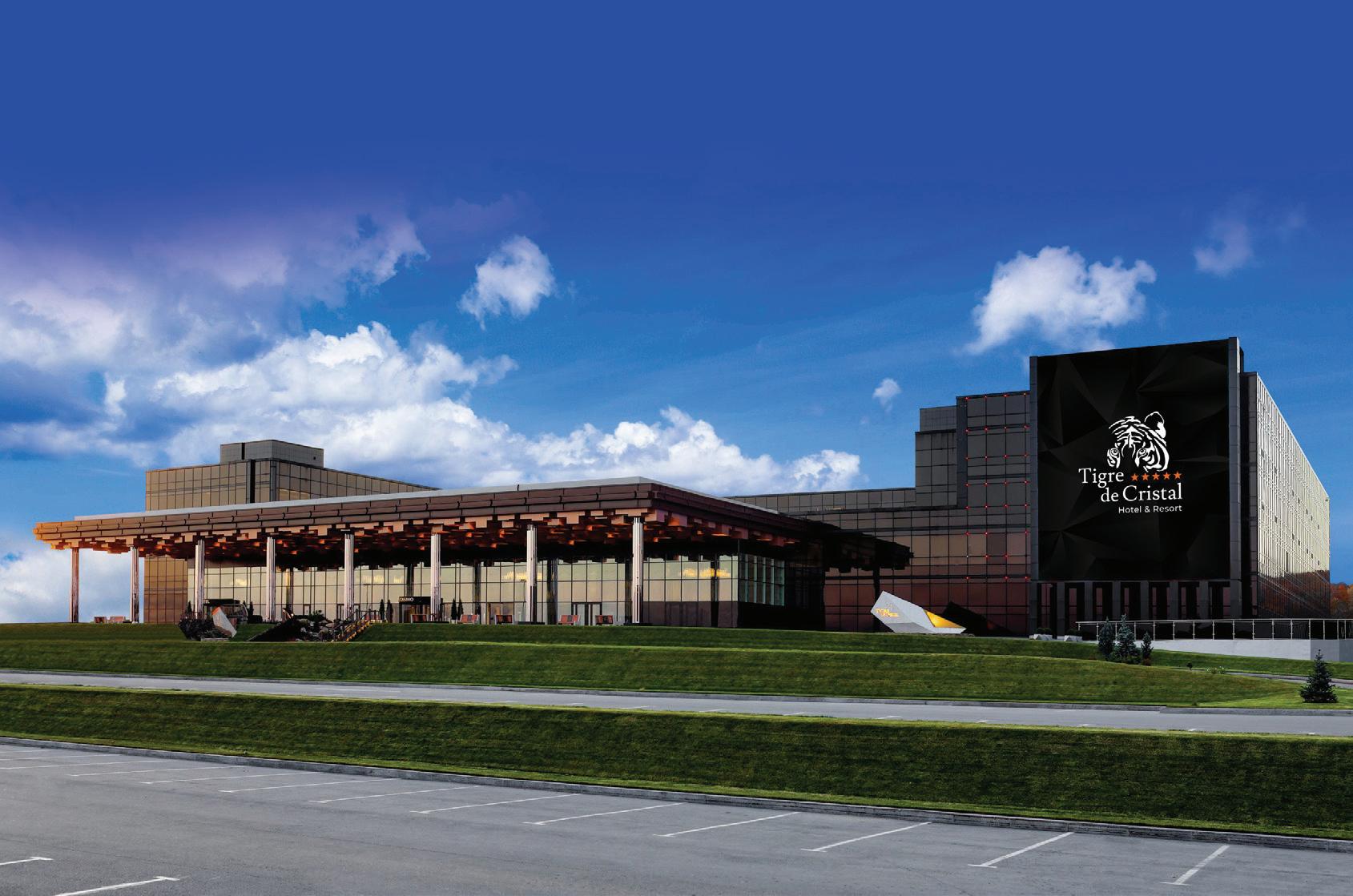

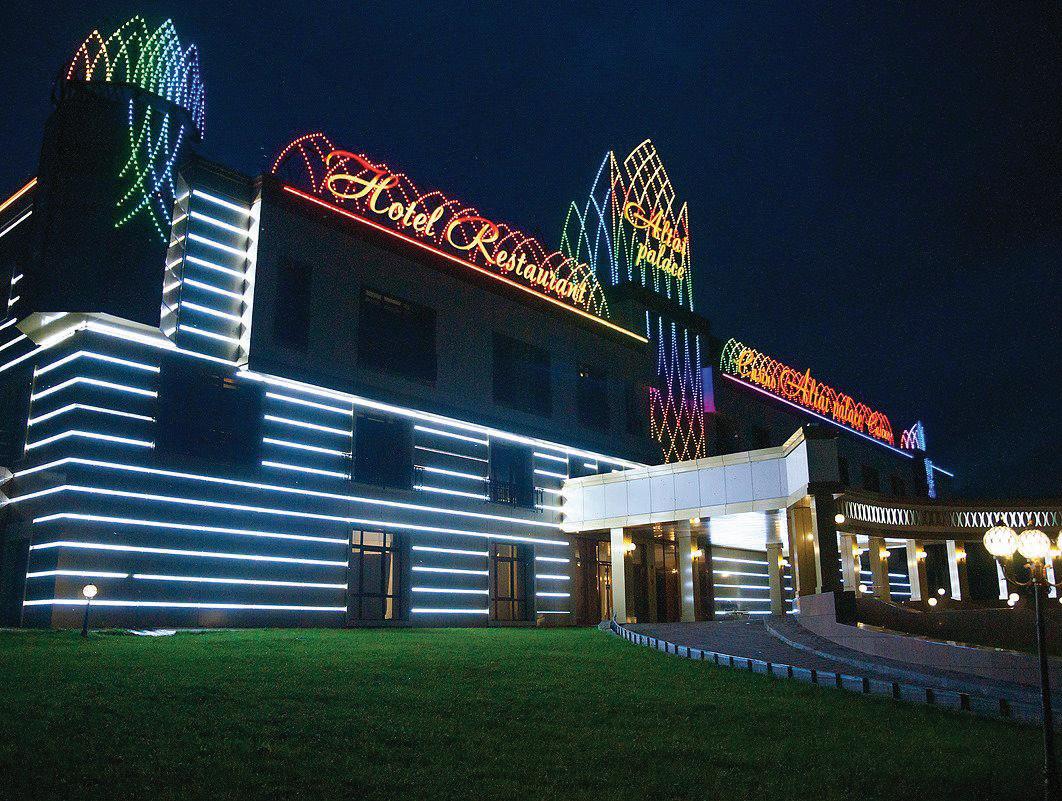
Anfinogenov continued, “Expanding the concept of the tourism industry will allow us to attract even more tourists, both domestic and foreign. Today gambling zones are full-fledged tourist sites in Russia with a large range of activities and event tourism. Changes in legislation will allow, among other things, to attract investors to the development of tourism infrastructure, the construction of accommodation facilities and so on.”
According to Dmitry Belyanin, CEO of Altai Palace in the Siberian Coin gambling zone, due to the situation that had developed in the gambling business by 2009, it is not surprising that casinos were long considered as “some kind of marginal establishments in Russia in the past, although in recent years the situation has radically changed.”
He explained, “It was like Dostoevsky. You came to a basement, lost all your money and shot yourself. Now guests have become more loyal to us. They are no longer afraid of us, they do not associate us with Sodom and Gomorrah. Visiting a gambling zone is now considered a cultural vacation. People have the idea that if you have been to a casino, it means you have some kind of certain social status.”

In the meantime, a similar position is shared by Stelios Tsifetakis, executive director of the Tigre de Cristal complex in Primorye. According to him, Russian casinos have reoriented themselves to creating the image of a “vacation spot.” He added that the gambling business has stopped promoting itself through gambling and is positioning itself as a tourist complex.
Tsifetakis elaborated, “Accordingly, visiting guests see that a casino is not some dubious underground facility where something illegal is going on. We are aware of our social responsibility and do not want people to become gambling addicts. In order to avoid a surge in gambling addiction, there is a self-exclusion rule in force. If a guest understands that he has an addiction, he can add himself to the list of visitors who will be banned from entering. In addition, if we see that a guest spends a lot, that he is for example drunk, we do not allow him to continue playing.”
Gambling zones in Russia also pay a number of taxes. In addition to the standard personal income tax, VAT, property tax and profit tax, there is a specialized tax on the gambling business. It is charged for each installed gaming table and machine and varies depending on the region: from 50,000 to 250,000 rubles for one table and from 3,000 to 15,000 rubles for one machine.
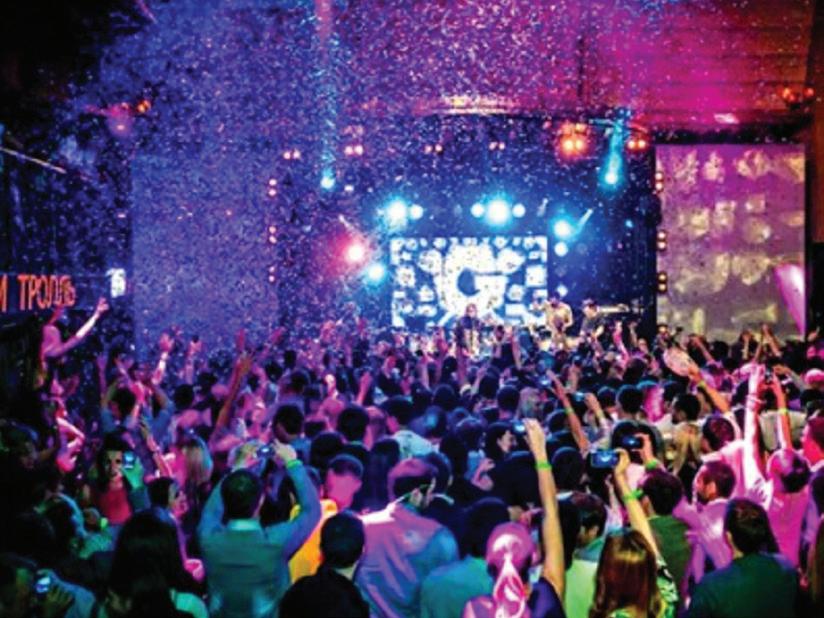

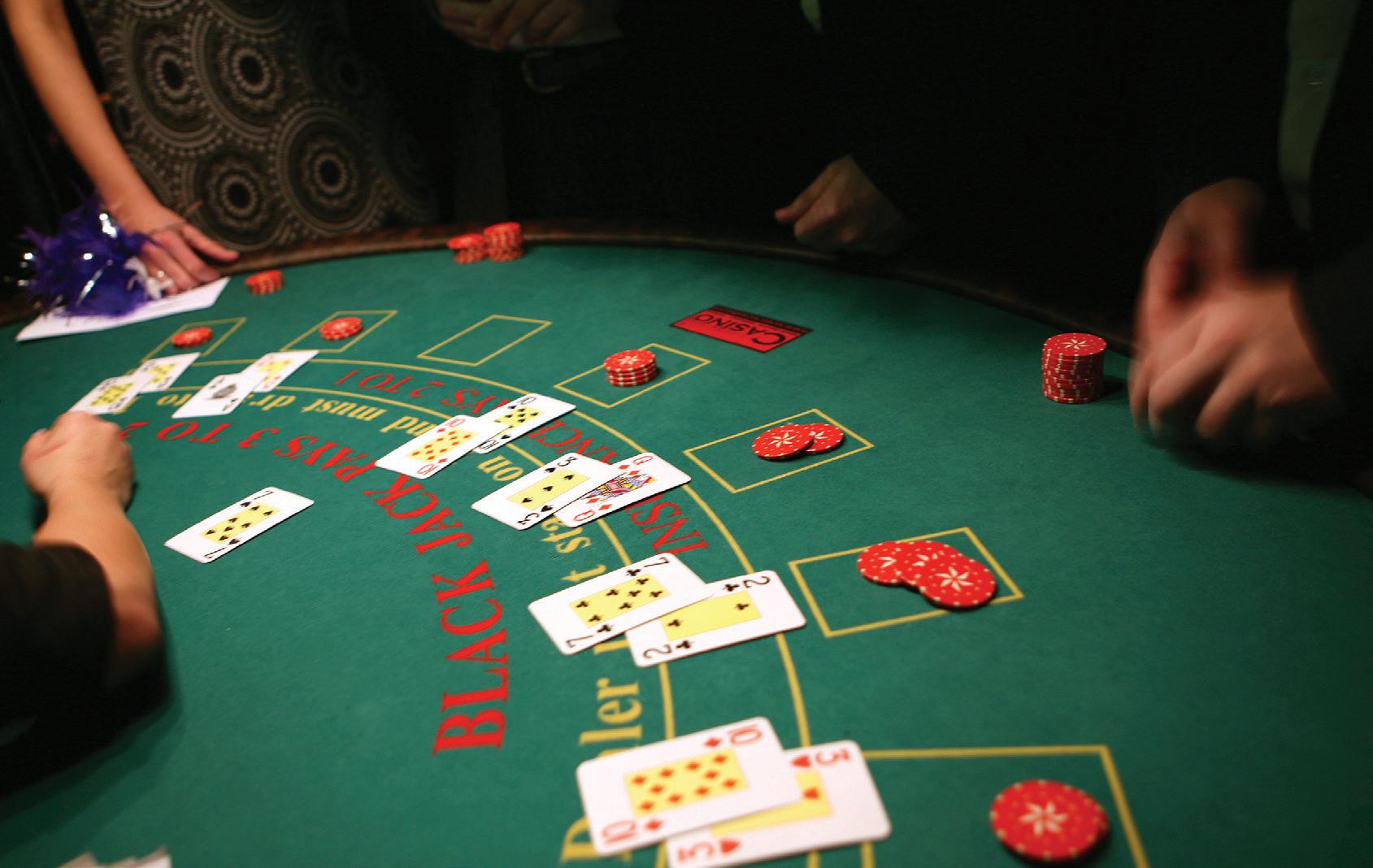
Do you like your job? How do you feel about your employer or the overall industry they are in? Do you feel they are ethical? If not, why do you work for them? As a blackjack dealer, I ask myself these questions all the time.
I am not talking about the day-to-day activities of my job; I am talking about the casino industry and how it impacts society. I have issues that I struggle with every day, but I have weighed the pros and cons that allow me to go to work with a clear conscience. Nonetheless, I still have issues that I grapple with and I would like to share them with you, my confession if you will.
I am by no means perfect. I am not a saint. I have my flaws just like anyone else. I can swear like a drunken sailor. I am not a drug user. In my college days I could drink a lot but, after becoming a parent doing the porcelain salute is not cool when you have two kids in diapers, so I became a responsible drinker in a hurry.
Now after having two or three beers I want to lie down for a nap.
But gambling remains my vice in life. Even though I deal blackjack, Texas Hold ‘em poker is my game of choice, followed by blackjack and baccarat. I enjoy playing the ponies and have wagered plenty on NFL games. Just as I matured and became a responsible drinker, I also became a wiser gambler, too.
Enough about me. What is my problem with the industry? Simply put, it preys upon those that can least afford it. It takes advantage of those that have cognitive-reasoning abilities. It squeezes every penny from someone who has an addiction, which can lead to broken families. Let us look at each case separately. If I am dealing at a $25 table and a wealthy individual wants some action, it is perfectly normal to see him buy in for $500, $1,000 or even $1,500. I have no problem with this. The man has the means and, if he loses, it is not a big deal for him.
But there is also the guy that is down on his luck with limited means, and this is his last $500 to his name. He has no prospects and this can be the difference between getting groceries or panhandling. Yes, you can make the counter argument that as adults we have freedom of choice and you are responsible for the choices that you make. I fully understand that but, for some, desperate times call for desperate measures and the casino only facilitates that. The question I grapple with is: Are we a net positive or a net negative on society for these people?
Secondly, we as an industry siphon money away from those less intelligent. Let’s face it, there are a lot of stupid people out there and the casino is more than happy to take their money There are players that should know better and make stupid plays, and they do not listen to me when it comes to basic strategy. Again, I am happy to oblige and take them to the cleaners, but there are those that are mentally handicapped, lacking in cognitive ability through no fault of their own and we as an industry will take advantage of their handicap. We are a governmentlicensed body and must treat everyone equally, including people with disabilities. But I still have an ethical dilemma taking someone’s money when they lack basic arithmetic skills, such as adding to 21.
Lastly, there are those with gambling addictions. If you are running a bar, it is illegal to serve someone who is intoxicated. Yet the casino industry will take the action of someone who has a gambling problem. The casino industry will say they have self exclusion programs for those that suspect they have a problem or they will run PR campaigns advising people what to do if they have a problem. With the profits casinos make I know they could be doing more. If you are not part of the solution then you part of the problem. While there are those with gambling issues, many are responsible gamblers and should not be penalized by the minority. There are many players that will bring $300 to $500 to the blackjack table, play basic strategy and let the chips fall where they may. If they win $500, good for them. If they lose, they take it like a man, walk away with their head held high, knowing Lady Luck did not shine on them. I will see them again in a month. That is responsible gaming and a legitimate form of
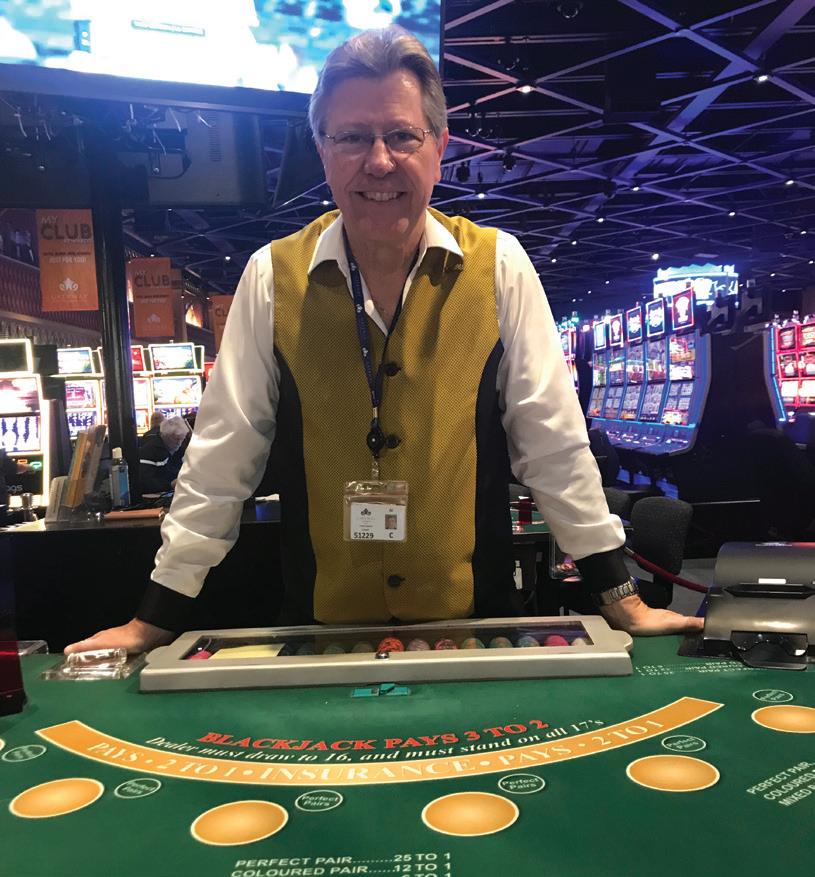
entertainment. What is the problem?
Governments take their cut from casinos. They are complicit. Every $1 it takes means $1 less it needs to tax the public. Those with gambling issues are collateral damage and I, as a dealer, am part of that machine.
So, if I am so self-righteous, why am I working in a casino? Is that not hypocritical on my part? I too must make choices and I can only control myself. I cannot control the actions of others. When I was in my mid fifties, I lost my job through no fault of my own. I still have debts and a mortgage. What do I do now? I am good at math; I have a gambling streak in me and I interact with the public well. Working in the casino was a natural transition. You must take the good with the bad, recognize the downside and do what is best for your family, even if that means sacrificing your principles.
There is a serenity prayer that has different variations that goes something like this …
God grant me the strength to change the things I can, the courage to realize the things I cannot and the wisdom to know the difference. I pray for courage, strength and wisdom every day.
This is only the beginning of what I dislike about the casino industry. In my next article, I will deal with another issue I have: money laundering.
’Til then, good luck at the tables and do not forget to tip the dealer.

Edwin Ford
Chinese gambling games have long held a prominent place in both traditional and modern gaming landscapes. Two of the most iconic Chinese games that have made their way into global casinos are Sic Bo and Pai Gow. These games have roots deep in Chinese culture. Their journey from ancient pastimes to popular table games in both land-based casinos and online gambling platforms offers an intriguing story of adaptation and growth.
In this article, we explore the origins and development of Sic Bo and Pai Gow, their emergence in casinos, and how they evolved into prominent online and electronic terminal-based games. We’ll also examine the global adaptations inspired by these classic games, the house edge (hold percentage) for each game, and the territories where these games are most popular in live-table casino operations, including their presence in the United Kingdom and Europe.
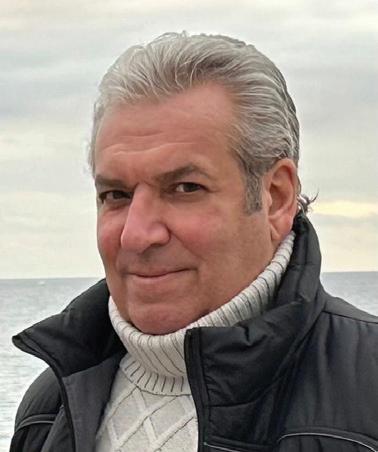
Sic Bo, meaning “dice pair” in Chinese, is one of the oldest and most-revered dice games in the gambling world. Its origins trace back more than 2,000 years to ancient China, where it was originally played with small bones or pebbles, evolving into the dice game we recognize today.
The game is believed to have been played during the Han Dynasty (206 BCE – 220 CE), where it was often used as a form of entertainment during festivals and celebrations. In its early form, Sic Bo used various small objects, such as bones or bamboo sticks, which were shaken and cast from a container. Players would bet on the outcomes based on the landing combinations of these objects. Over time, the game
transitioned to using dice, which was more practical and standardized for modern play.
Sic Bo first appeared in the casino world in the early 20th century, particularly in Macau, where it became a popular gambling game in Chinese communities. The game then spread to other parts of Asia and beyond, as casinos expanded into new markets. The game is easy to understand, yet offers a wide range of betting options, making it appealing to both casual and experienced players.
• Traditional Casino Tables: In land-based casinos, Sic Bo quickly became a popular table game, often placed alongside other classic casino offerings like roulette and baccarat. The large betting layout and the excitement of rolling three dice generated a unique atmosphere at the tables.
• Electronic and Terminal Games: With the advent of electronic gaming machines, Sic Bo made its transition to electronic terminals in the late 20th century. These terminals mimicked the game play of traditional Sic Bo tables but were automated, allowing players to interact with touchscreens to place their bets and watch the dice roll digitally. This made Sic Bo more accessible and increased its reach to players who may not have been familiar with the traditional format.
As online casinos began to rise in prominence during the 2000s, Sic Bo found a natural home on digital platforms. Many online casinos began offering virtual Sic Bo games, where players could simulate the excitement of the traditional dice rolls from the comfort of their homes. These versions often include various betting options, animated dice rolls and the ability to play at any time. Moreover, the rise of live-dealer Sic Bo has allowed online casinos to replicate the brick-and-mortar casino experience, where players interact with real dealers via live video feeds, providing an immersive and engaging environment.
The house edge for Sic Bo varies depending on the bet being placed. Here are some typical house edges for different betting options:
• Small/Big Bet (betting on whether the total of the dice will be small (4–10) or big (11–17)): 2.8 percent
• Specific Triple Bet (betting on a specific triple like 1-1-1, 4-4-4, etc.): 16.2 percent (highest house edge)
• Any Triple Bet (betting that any triple will appear): 11.1 percent
• Combination Bet (betting on two specific numbers): 5.5 percent
• Total Sum Bet (betting on the sum of the dice): Varies between 7.4 percent and 12.5 percent, depending on the specific sum.
Sic Bo is primarily popular in the Asia-Pacific region but has seen substantial growth in landbased and online casinos globally. The following are the primary territories where Sic Bo is commonly played:
• Macau: As the gambling hub of Asia, Macau is home to numerous casinos where Sic Bo is a prominent table game. The game is often found in the VIP rooms and on the main gaming floor of large resorts and casinos, such as The Venetian Macao and Galaxy Macau.
• Singapore: Sic Bo is widely played in resorts such as Marina Bay Sands and Resorts World Sentosa. These destinations attract both international tourists and locals, with Sic Bo featured prominently alongside other popular casino games.
• Las Vegas: While less common than in Asia, Sic Bo can be found, particularly in casinos with a focus on Asian gaming, like The Orleans and The Venetian Las Vegas. Sic Bo’s popularity has been growing in the United States market in recent years, especially in regions with a large Asian population.
• Online Casinos: Online platforms such as Bet365, Leo Vegas, and William Hill, to name
but a few, offer a wide variety of Sic Bo games, including live-dealer options, attracting a global audience.
Sic Bo is not as widely played as other traditional casino games like roulette or blackjack, but it can still be found in certain casinos and online platforms:
• UK: While Sic Bo is not a mainstream game in UK land-based casinos, it can be found in some venues with a focus on offering Asian-style games. It is available at some online UK casinos, particularly those that provide a wide range of international games. Platforms like Bet365 and 888 Casino often feature Sic Bo, especially in their live-dealer sections.
• Europe: Sic Bo is primarily found in Macaustyle casinos or those catering to Asian visitors, such as in Monte Carlo or London's Chinatown. However, it remains less common compared to more traditional European games. Sic Bo is available at many European online casinos, including Leo Vegas and Casino.com, with livedealer versions providing an authentic experience.
Unlike Sic Bo, which originated as a dice game, Pai Gow has its roots in Chinese dominoes. The game is believed to date back to the Tang Dynasty (618–907 AD), and its popularity surged during the Song Dynasty (960–1279 AD). Originally played with a set of 32 Chinese dominoes, the game was a traditional pastime that combined both skill and luck, with players arranging dominoes to form specific combinations.
In the early 20th century, Pai Gow underwent a significant transformation. In the U.S., casinos began to adopt Pai Gow as a card game, using a standard deck of 52 playing cards and a joker instead of the original domino set. This version, known as Pai Gow Poker, was introduced in California in the 1980s by Sam Torosian, a casino owner who sought to modernize the game for the American casino market.
The introduction of Pai Gow Poker into the casino scene brought a fresh, strategic approach to card games. The game was immediately popular due to its unique hand-formation rules: Players are dealt seven cards and must create two hands – one with five cards and one with two cards. The objective is to form hands that beat the dealer’s corresponding hands.
• Casino Tables: Pai Gow Poker quickly became a staple in land-based casinos, both in the U.S. and internationally. Its slower-paced, social nature made it popular for players who wanted to engage in a more-relaxed, strategic gambling experience, particularly when compared to faster games like blackjack or roulette.
• Pai Gow Tiles: Another variation, known as Pai Gow Tiles, uses a set of 32 Chinese dominoes instead of playing cards. This version is also popular in Asian casinos, especially in Macau. It continues to maintain its traditional roots while attracting modern players looking for an alternative to poker-based versions.
As with Sic Bo, the advent of online gambling transformed the way Pai Gow is played. Online casinos began offering Pai Gow Poker and Pai Gow Tiles to a global audience, with digital interfaces and live-dealer options. The online experience is often enhanced by interactive elements, such as the ability to chat with dealers and other players in live rooms.
In addition, Pai Gow Poker has made its way into electronic gaming terminals in casinos. These terminals offer an automated version of the game, where players interact with a screen to arrange their hands and play against the computer rather than a live dealer or other players. The terminals mimic the feel of a traditional table game but offer the convenience of automated play.
Pai Gow has one of the lowest house edges in the casino world, especially when played optimally:
• Pai Gow Poker: The house edge typically sits around 2.5 percent to 2.8 percent for a player who plays optimally and follows the best strategy.
• Pai Gow Tiles: The house edge for Pai Gow Tiles is slightly higher, around 2.8 percent to 3.5 percent, depending on the casino and the specific rules of play.
Pai Gow is widely enjoyed in land-based casinos, particularly in Asia, North America and Europe. The following territories are key locations where Pai Gow is frequently found:
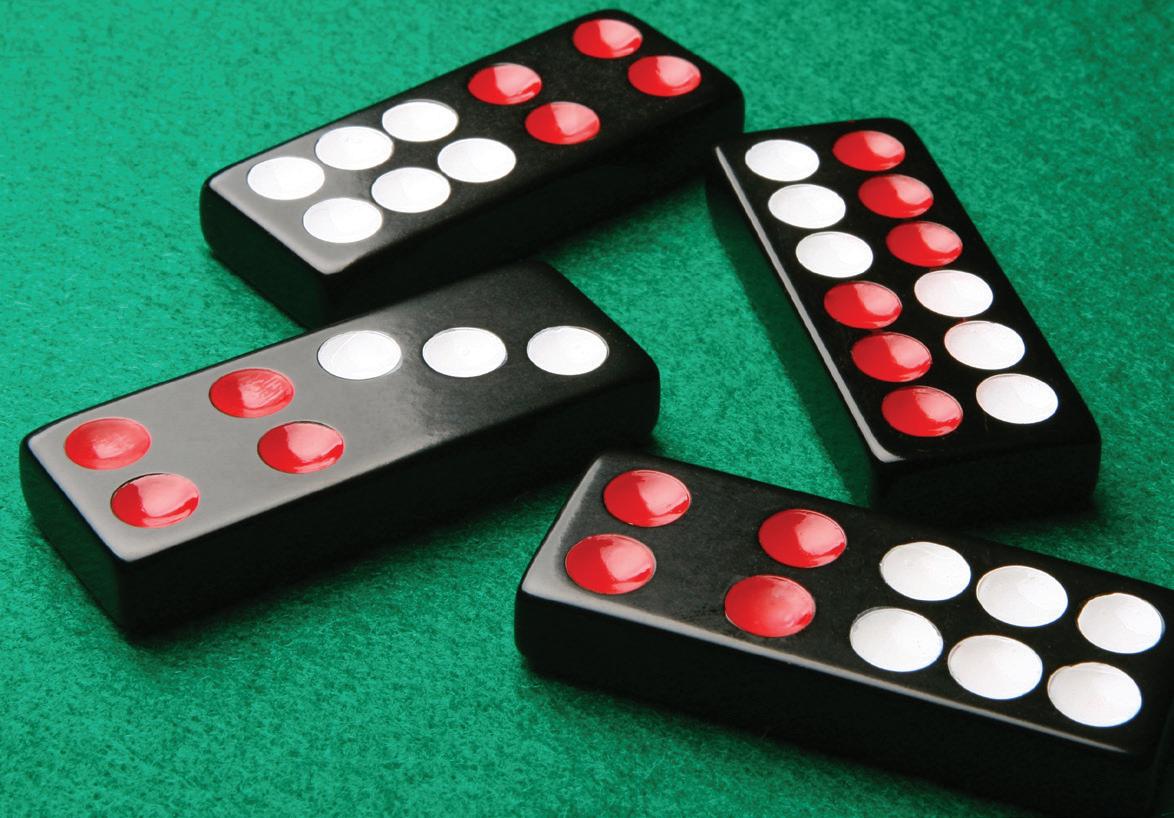
• Macau: Pai Gow Tiles is extremely popular in Macau’s casinos, such as The Venetian Macao and Wynn Macau. Pai Gow Poker has also gained traction in the region.
• Las Vegas: Pai Gow Poker is a favourite game in Las Vegas, where it is commonly found in casinos like The Venetian and Caesars Palace. Pai Gow Poker is especially attractive to casual players due to its slower pace.
• California: Pai Gow Poker originated in California, and the game remains incredibly popular in California’s card rooms and casinos, especially in cities like Los Angeles or San Francisco.
• Singapore: Pai Gow Poker has been incorporated into the two casino operations, Marina Bay Sands and Resorts World Sentosa, where it enjoys steady popularity.
• Online Casinos: Like Sic Bo, Pai Gow also has a significant presence in online casinos, where livedealer versions are available for global players.
Pai Gow Poker is more commonly found than Sic Bo due to its similarity to other popular poker-based games. However, its presence remains somewhat niche:
• UK: Pai Gow Poker is offered in some UK-based online casinos such as Bet365, 888 Casino and William Hill. However, it’s less commonly found in physical casinos across the UK. Some UK casinos with a broader range of international games may offer Pai Gow, but it’s not as widely available as blackjack or roulette.
• Europe: Pai Gow Poker can be found in European online casinos such as Leo Vegas and Casino. com. In land-based casinos, Pai Gow Poker may be offered in select venues, particularly in Monte Carlo and Macau-style casinos that cater to high rollers or tourists from Asia.
Sic Bo and Pai Gow are prime examples of how ancient Chinese games have evolved and adapted to the modern casino world. From their humble beginnings as dice and domino games in ancient China to their widespread popularity as table games in both land-based casinos and online platforms, these games have shown remarkable staying power.
As electronic terminals and live-dealer formats continue to innovate, both games are well-positioned to thrive in the future, offering players unique gambling experiences that bridge the gap between traditional and modern game play. The journey of Sic Bo and Pai Gow is a testament to the resilience of cultural heritage and the exciting possibilities of adapting ancient games to contemporary gaming technology.

Introducing the official mobile app for earning money through the 1xPartners affiliate program
he global betting company 1xBet offers anyone a perfect way to earn extra income — the 1xPartners affiliate program, based on traffic monetization. The company has created an official mobile app with a wide range of useful tools to make earning with the program even easier and more convenient.
The international brand 1xBet has been successfully operating in the betting and gambling industry for 18 years. It rightfully holds a leading position in the iGaming market.
The bookmaker offers gambling fans a wide range of sports and esports bets, as well as a large collection of online games from top providers. 1xBet is especially proud of its generous welcome bonus for new players, regular casino tournaments with big prize pools and various promos with cashback, bonuses, and valuable prizes.
All the advantages of 1xBet make it easy for 1xPartners members to direct their audience to the bookmaker’s platform and earn generous commissions. The program’s success is proven by over 300,000 partners worldwide – thanks to their efforts, 1xBet attracts more than three million players every month.
The 1xPartners affiliate program offers members the most profitable terms and a wide range of marketing tools:
• High conversion rates (of up to 65 percent)
• Generous commissions for each referred player (of up to 50 percent)
• Different cooperation models (CPA, Hybrid and Revshare)
• Weekly payouts through 250-plus payment methods
• Real-time monitoring and analytics
• Access to a large library of quality promo materials
• Cross-platform software (Web, iOS, Android)
• Coverage in over 150 countries
• Personal manager
The official mobile app allows you to work with the 1xPartners affiliate program anytime and anywhere. To effectively manage your business, all you need is a smartphone and mobile internet access.
The 1xPartners app combines high speed, a user-friendly interface, and rich functionality. Here are just some of its key advantages:
You no longer have to carry your laptop around as, with the 1xPartners app, you can manage your affiliate network from your smartphone. Do you have a free minute on the road, at the office or a concert? Open the app and check key program metrics, commission size and any other data— simple, easy, and convenient.
The 1xPartners app provides full access to upto-date statistics, including the number of new sign-ups, user activity and current earnings. This allows you to instantly analyze results and immediately improve your strategy to maximize profit.
Want to stay updated but don’t want to constantly check the app? Set up notifications and the 1xPartners app will automatically alert you about changes in key metrics of your affiliate business.
The 1xPartners mobile app was created by experienced developers and designers, using the latest development technologies. As a result, the app works quickly and reliably on any smartphone, consumes minimal battery and mobile data, and has an intuitive interface that any user can easily navigate.
If you have any questions or need assistance, you can contact customer support directly through the 1xPartners mobile app. You won’t need to make a call or send an email – just press one button in the app and chat confidentially with your personal manager in the online chat.
The global brand 1xBet strives to provide all its customers with the best products in the industry, including its betting and gambling platform, as well as the 1xPartners affiliate program. The professionalism and high standards of the company in affiliate marketing and mobile-app development are confirmed by numerous prestigious awards. Among them are “Affiliate Company of the Year” at the International Gaming Awards 2024 and SiGMA Asia Awards 2024, “Best on Mobile 2025” at the SiGMA Africa Awards 2025, and “Mobile Sports Product of the Year” at the International Gaming Awards 2025. The impeccable reputation of 1xBet is highlighted by the brand’s official partnerships with FC Barcelona, Paris Saint-Germain, LOSC Lille, Italian Serie A, CAF, FIBA, Volleyball World, ESL, Aurora, Bestia, Beastcoast, and other globally recognized sports and esports organizations. The 1xPartners affiliate program and mobile app set new trends in affiliate marketing, offering the best opportunities for anyone who wants to become an important part of a successful team and earn a stable, high income.
Install the official 1xPartners app on your smartphone, and the key to success will be right in your hands!
Founded in 2007, 1xBet has accepted bets online since 2010, becoming a key player in the sports betting industry. Operating in 70 languages, the 1xBet platform is one of the world’s most popular betting sources and offers more than 250 ways to deposit and withdraw winnings.
Every month, three million 1xBet clients can access over 17,000 sports events to bet on and watch 6,000 video broadcasts of various matches for free. 1xBet customer support works around the clock and is ready to promptly answer any question.
1xBet collaborates only with the best and is an official partner of FC Barcelona, Paris Saint-Germain, LOSC Lille, La Liga, Serie A, and other famous sports clubs and organizations.


Andrew Behan
Casinos like to pretend that they’re egalitarian spaces, none more so than the original Caesars Palace. ‘Every man an emperor’ was creator Jay Sarno’s guiding maxim. But we all know that the care and feeding of high rollers is paramount to the bottom line. This was certainly the case when Harrah’s New Orleans was reimagined into Caesars New Orleans in time for that whale magnet, the Super Bowl. Caesars Entertainment entrusted the design of its new high roller area to Oakland, Californiabased Moz Designs. To find out what went into the crafting of this special space, Associate Editor Andrew Behan spoke with the company. Their conversation has been edited for clarity.
Móz Designs has worked on a wide range of projects, but casinos have unique design requirements. What were the main goals for the high roller area renovation at Caesars New Orleans?
For the high roller area renovation at Caesars New Orleans, the primary goal was to update the space. We were moving away from the outdated Mardi Gras theme and transitioning to a more modern, luxurious aesthetic that aligns with the Caesars brand. The casino, originally built 25 years ago, required a fresh approach to elevate its appeal.
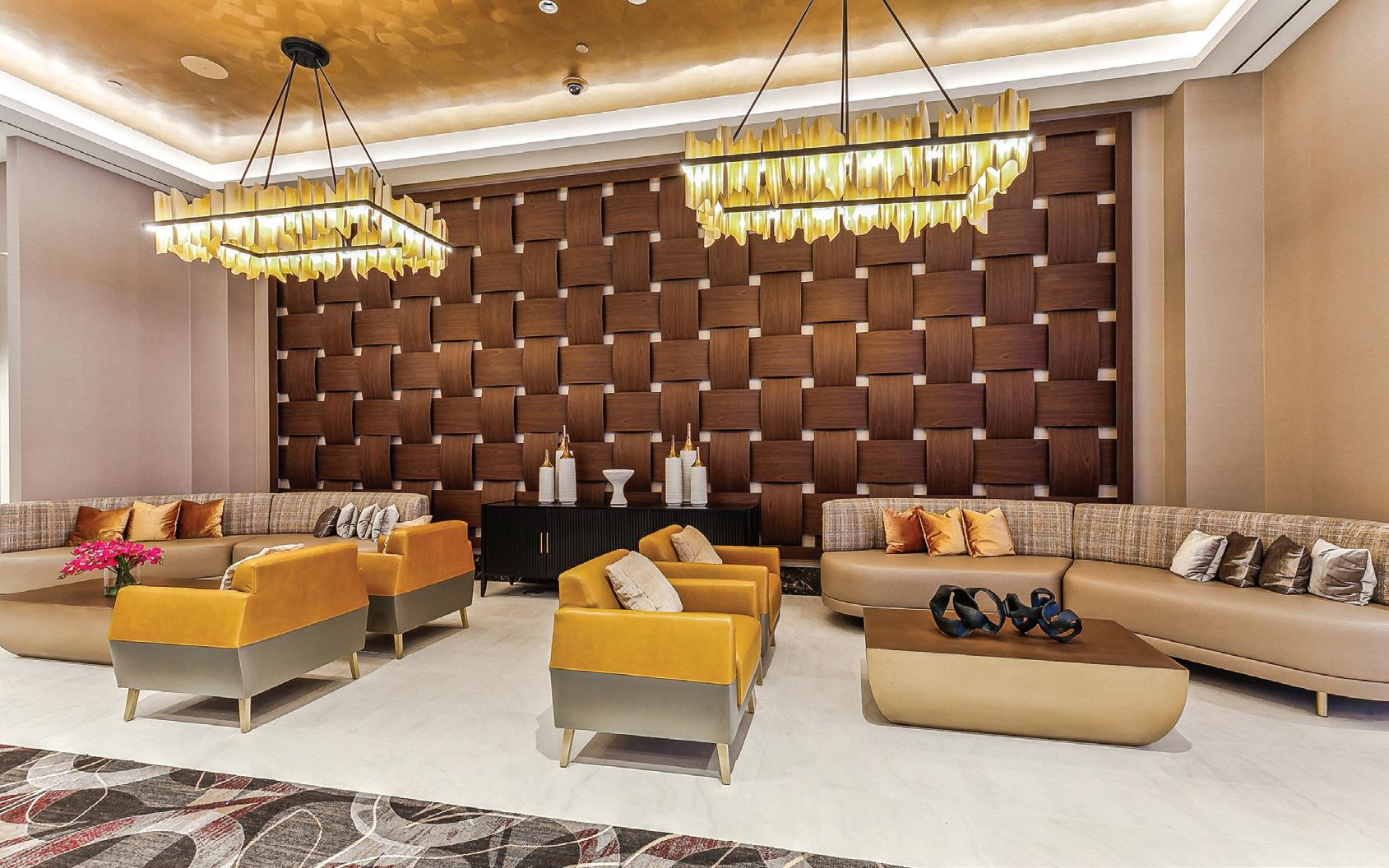
Privacy is a key element in exclusive gaming areas. How did Móz’s architectural metalwork help achieve the desired level of privacy while maintaining an open, luxurious feel?
I love how our golden, laser-cut panels offer a modern, high-end aesthetic for the cashier cage while maintaining a sense of openness. The rich, gold tones evoke feelings of wealth and luxury, while the intricate patterns provide a refined, sophisticated look. The design effectively balances privacy with an airy, luxurious atmosphere, ensuring that the space feels both exclusive and inviting without being overwhelming.
Casinos are known for their rich visual appeal. How did Móz incorporate its signature balance of color, texture and grain to enhance the high roller area’s aesthetic?
The grain patterns characteristic of our classic colors add visual depth and dimension, creating a dynamic interplay with light. As patrons move through the space, the patterns subtly shift and evolve, infusing the area with a sense of life and energy. This fluid movement not only enhances the aesthetic but also contributes to an exciting, immersive atmosphere that captivates guests.
How did you collaborate with JCJ Architecture and Ryan Gootee General Contractors to bring this vision to life?
This project faced delays due to post-pandemic inflation, which impacted several areas of the renovation. Throughout the process, Móz provided ongoing design and budget support to help navigate these challenges, and find the right solutions. Once the budget was finalized, we worked closely with the designer and owner, offering product samples to finetune the finishes and make the final selections.
Additionally, we provided detailed drawings to the contractor, ensuring they had a clear understanding of how each component would arrive and how they should be assembled. This helped streamline the installation process and avoid any confusion. We also coordinated the scheduling of product delivery to ensure everything arrived on time, keeping the project on track and minimizing delays.
Were there any specific challenges in fabricating or installing the metal surfaces for this project? If so, how did your team overcome them?
One unique challenge we faced was that this was the first time we produced our basket-weave product with the Skinz finish. However, the finish proved to be highly compatible, even on the perimeter frame.
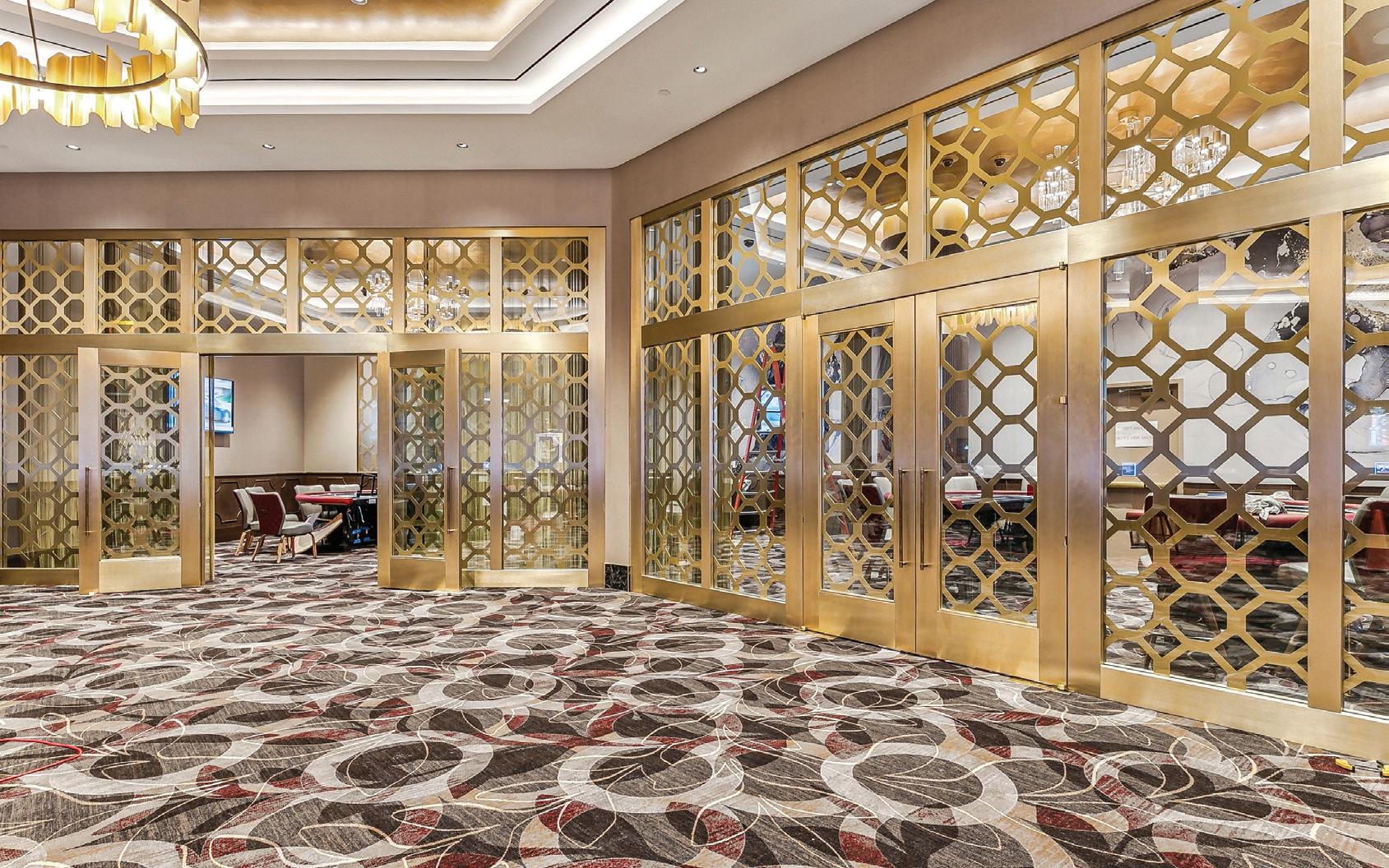
The basket-weave product uses set panel sizes that cannot be scaled, so we had to rely on the contractor’s field measurements to ensure the panels fit seamlessly within the space. By working closely with the contractor, we were able to adjust the product to cover as much of the area as possible without requiring any modifications in the field, ensuring a smooth installation process.
What materials and finishes were chosen for the high roller area, and why?
Moz Basket Weave Wall was employed in the high roller area, made up of 143 individual, 14-inch by 30-inch panels in a Skinz Wenge Wood finish, with a matching perimeter frame. For the laser-cut panels of the glass wall in the lobby we provided two sets of six panels (covering 185 square feet), made of aluminum in a custom, laser-cut pattern, finished in Classic Goldrush Coarse gloss on both sides. The design included matching perimeter frames and custom trims to complete the wall. Installation and assembly were performed by others. As for the cashier’s cage panels, four laser-cut panels with perimeter frames and direct fastening were done by others.
Acoustics and lighting play a major role in the casino experience. Did Móz’s metal installations
contribute to sound control or enhance the lighting design?
The reflective quality of the metal interacts beautifully with the lighting, enhancing the overall ambiance and creating a dynamic play of light and shadow that elevates the aesthetic experience of the casino.
What trends are emerging in casino and hospitality design that Móz is excited to explore?
We're seeing a strong move toward experiential design in casinos and hospitality spaces – where every detail contributes to a memorable, immersive guest experience. There's a big focus on layered textures, biophilic elements and lighting that can shift atmospheres throughout the day. At Móz, we're especially excited about the trend of using materials that bring both visual and tactile richness to a space. Our metalwork allows us to create dimensional surfaces that play with light and shadow, helping to transform traditional walls or partitions into artful design features. We’re also leaning into modularity and customization, which gives designers more freedom to adapt spaces for different audiences and experiences.
How does Móz Designs cater to the evolving needs of luxury hospitality and gaming environments? Luxury hospitality and gaming spaces are evolving
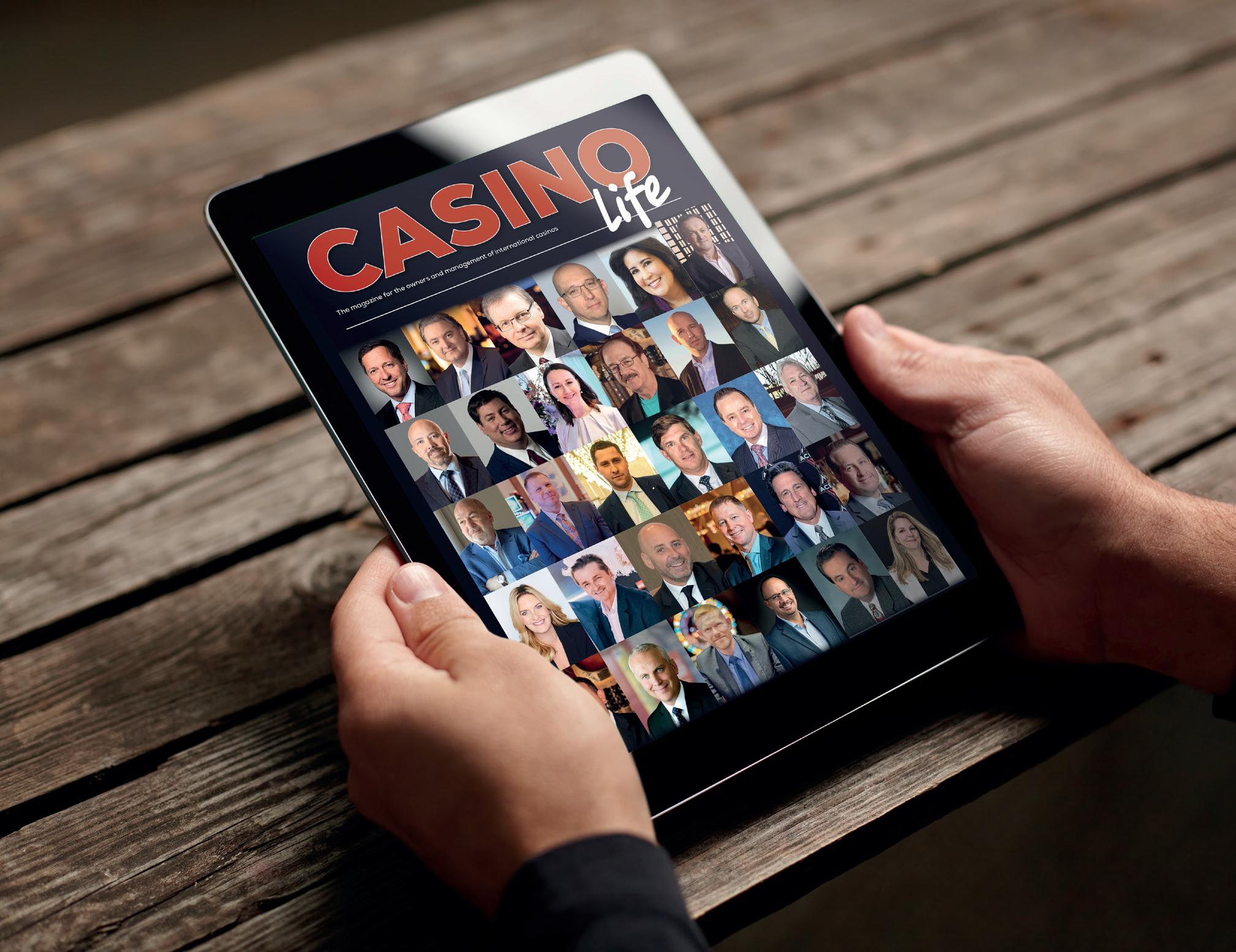
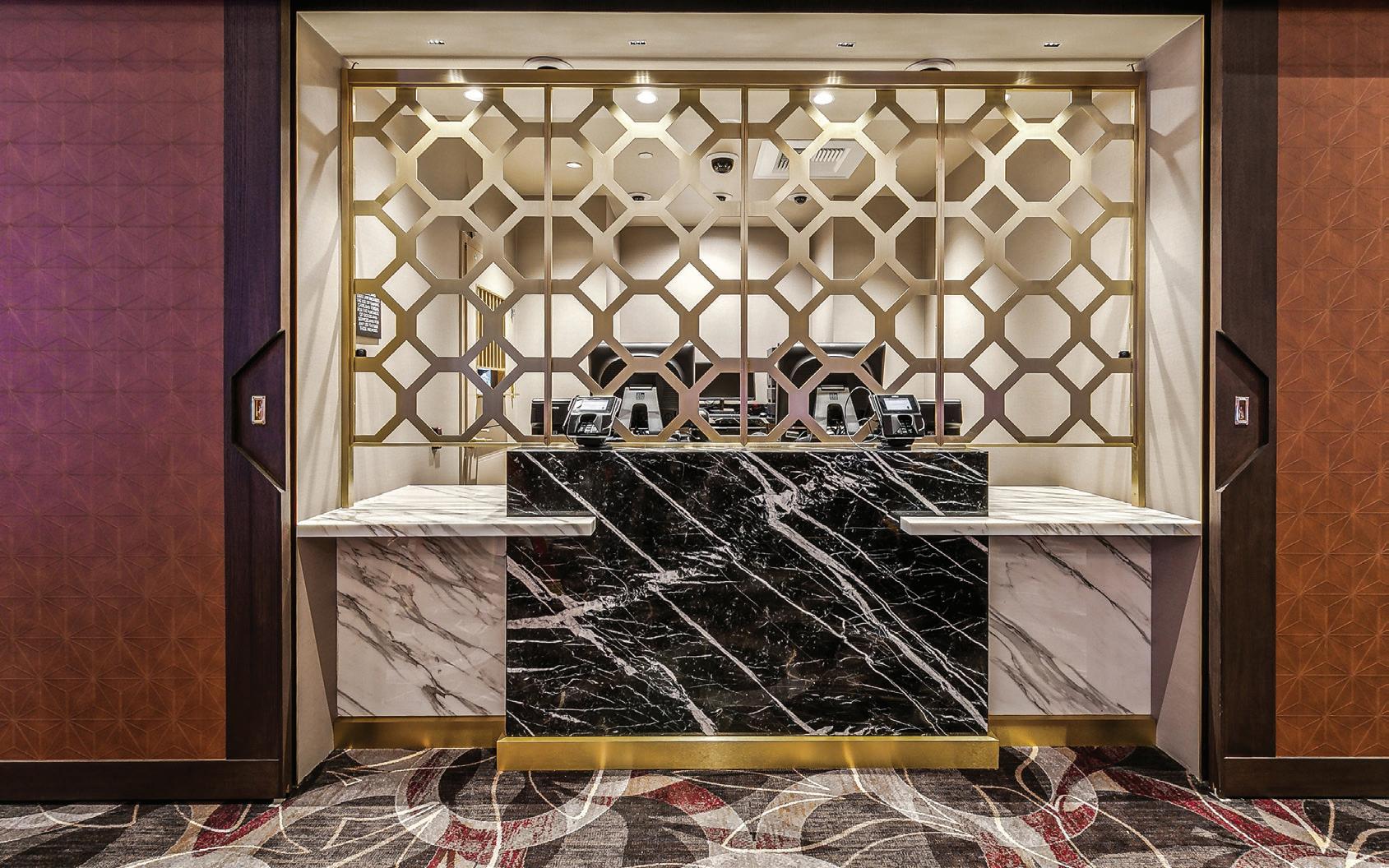
to feel more intimate, curated and story-driven. Our approach at Móz is to support that evolution by offering a versatile toolkit of metal finishes, patterns, and textures that deliver high-impact visuals while standing up to the wear and tear of high-traffic environments. Whether it's a refined, woodgrain metal for a warm, natural feel or a bold, laser-cut pattern for a dramatic entrance, our materials are engineered to meet both aesthetic and functional needs. We also work closely with architects and designers throughout the project lifecycle, ensuring our products support their creative vision while meeting practical requirements like installation timelines, durability, and maintenance.
Have you noticed a shift in how casinos approach design, especially with the rise of high-tech gaming experiences and immersive entertainment?
Absolutely – casinos are no longer just about gaming; they’re becoming multi-sensory entertainment hubs. With the rise of high-tech gaming and immersive environments, there’s a shift toward creating dynamic spaces that feel fluid and engaging, not static. This is where architectural materials like ours play a big role. Metal surfaces can respond beautifully to integrated lighting systems, adding depth and movement to digital experiences.
With the success of the Caesars project, do you see Móz expanding its presence in the casino and gaming industry?
We have a lot of experience in this industry, and it’s always exciting to have a hand in casino and gaming projects. We look forward to continuing to work in these industries.
What’s next for Móz Designs in terms of innovation and product development?
We have a very exciting launch coming in mid-April. We are leaning into the layering trends we’ve seen lately and are excited to expand one of our collections with dynamic designs.
If a casino designer is looking to integrate Móz’s metalwork into their project, what advice would you give them?
My advice would be to reach out to us! We offer a wide variety of metal styles and finishes, with both standard solutions and customizable options to fit any project. We’re here to collaborate with designers to ensure that the integration of our metalwork is seamless, considering installation timelines, functionality and feasibility, all while preserving the integrity of the design vision. Our team is dedicated to helping bring your concept to life from start to finish.
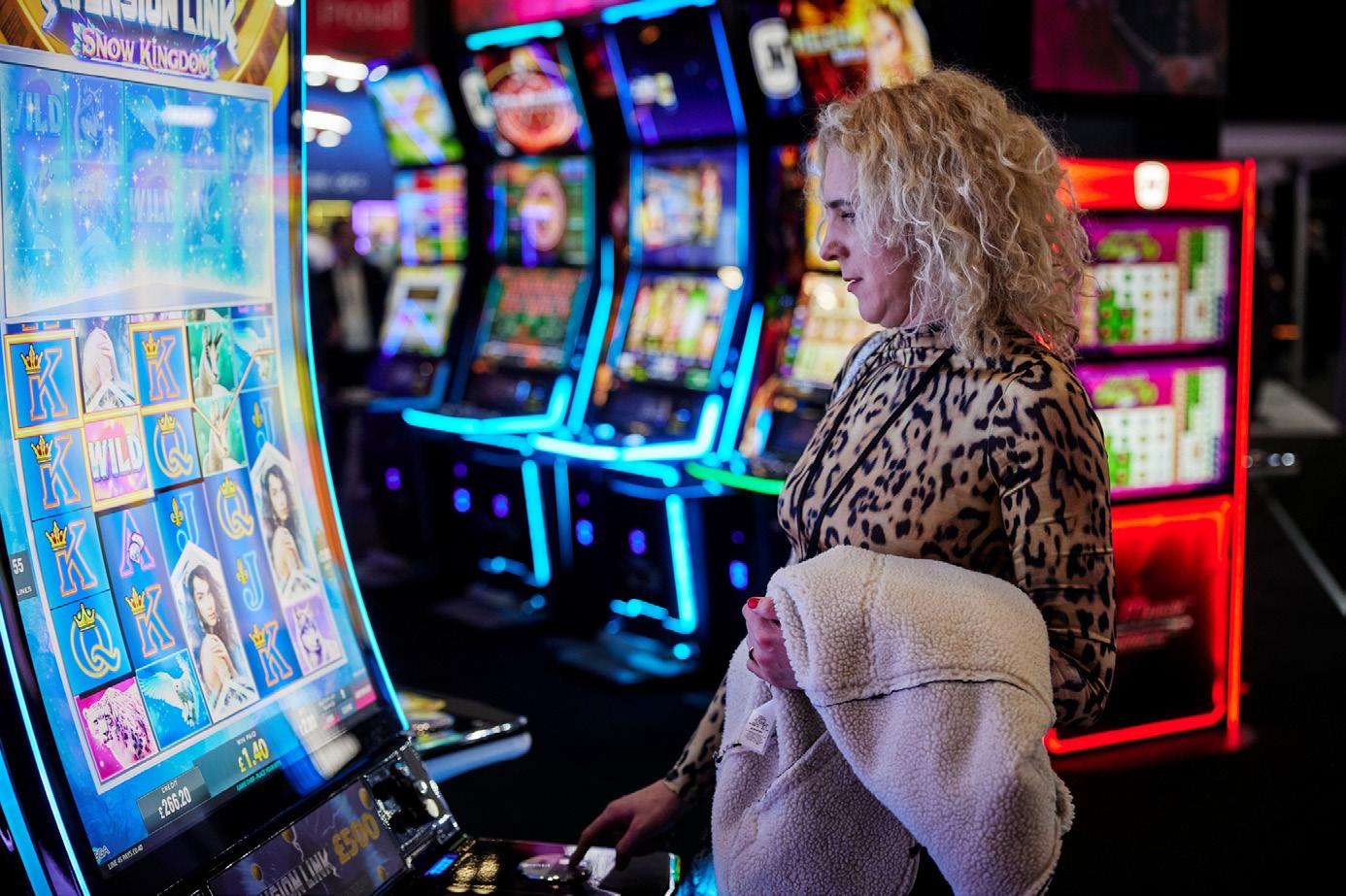

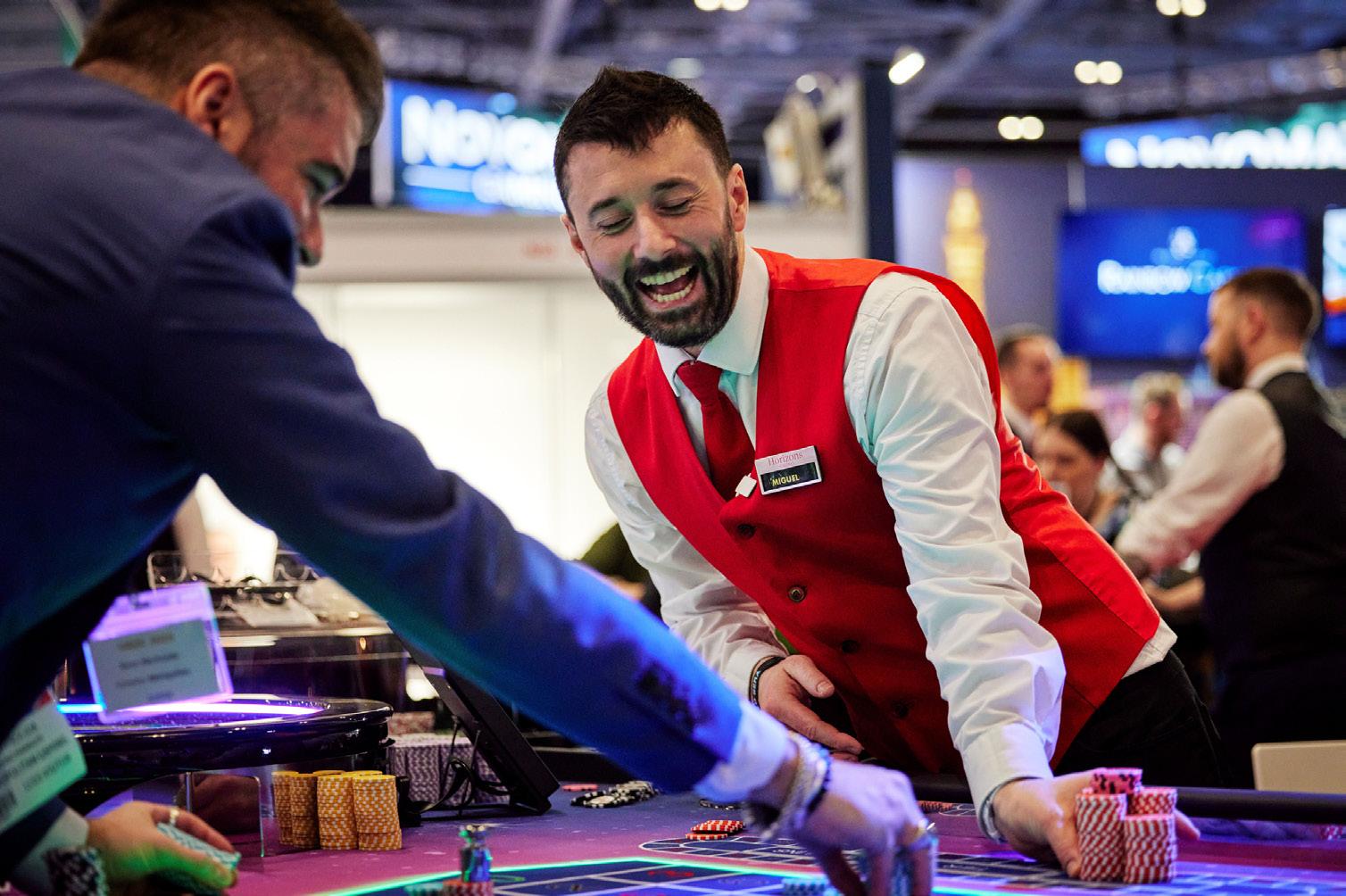


Corporate strategy in the new AI era. By Raymond Chan
s we transition into a new era defined by rapid technological advancements, the distinction between artificial intelligence (AI) and intelligence augmentation (IA) becomes increasingly vital. While AI has often been viewed as an autonomous tool designed to perform tasks traditionally handled by humans, IA emphasizes a human-centric paradigm: enhancing and augmenting human capabilities and not replacing them.
The IA focus is crucial for organizations looking to thrive in an increasingly complex landscape with the rapid development of AI technologies. Incorporating IA into corporate strategy not only fosters innovation but also empowers employees, enabling them to leverage advanced technologies to enhance their decisionmaking, creativity and productivity.
To effectively incorporate IA into corporate strategy, the first step is identifying the core domains that are essential for the business’s survival and growth. These domains serve as the foundation upon which organizations can build robust AI models tailored to their unique needs. By focusing on areas that directly impact the company’s competitive advantage,

Raymond Chan
businesses can ensure that their investment in IA is both strategic and beneficial.
For instance, in the gaming industry, the design department plays a pivotal role. Here, creativity and innovation are paramount, and integrating IA can enhance game design processes, streamline workflows and facilitate more-engaging user experiences. By leveraging IA, designers can access
advanced tools that assist in generating ideas, optimizing game mechanics and analyzing player feedback in real time.
Similarly, for service-oriented businesses, customer relationship management (CRM) is another critical domain. Understanding customer preferences, behaviors and feedback is essential for delivering superior service. IA can augment CRM systems by providing insights through data analysis, automating responses and predicting customer needs. This not only enhances customer satisfaction but also fosters loyalty, driving long-term success.
To capitalize on these core domains, it is crucial to understand the success factors that define them. Organizations must analyze what intelligence elements give them a competitive edge — be it real-time analytics, enhanced user interactions or predictive modeling. By identifying these factors, businesses can design IA solutions that directly address their specific challenges and objectives. This foundational knowledge will set the stage for the next critical step: designing an AI model that effectively integrates with these core domains, harnessing their potential to drive innovation and growth.
A critical component of effective intelligence augmentation is the establishment of cognitive layers and associated tools that facilitate machine learning of AI models. The primary objective of the cognitive layer is to create a channel through which human operators can train AI systems in a human-centric manner. This layer not only facilitates training but also provides immediate feedback, elucidating the reasoning behind the actions taken by artificial-intelligence agents. This ensures that the direction of augmentation remains aligned with human values and objectives. Consumer-grade products like Google’s NotebookLM is illustrating the potential, and it can be set as a foundation for developing corporate-level products to grow upon.
For IA in game development, tools shall be built around the control of AI-generated content which should closely reflect the ideas and creative vision of game designers. Similarly, in customer relationship management (CRM) systems, tools should focus on how AI agents are aligned with the company’s mission statement, ensuring that automated responses resonate with organizational values.

Raymond is a software engineer by profession with a track record in corporate innovation and entrepreneurship. He co-founded two prosperous startups, TGG Interactive and Global Gaming Group in USA and Asia respectively, where he served as director and CEO to lead the electronic gaming businesses from 2007 to 2018. Earlier in his career, Raymond was a founding member of the business intelligence team at ETRADE from Morgan Stanley and played a pivotal role in designing the TiVo customer intelligence system in Silicon Valley.
NVIDIA CEO Jensen Huang couldn't have said it better: AI isn't here to replace you, but someone who knows how to use it effectively might. The integration of IA into corporate strategy not only gives the opportunity to empower employees. It also aligns AI initiatives with organizational values and goals. As we continue to explore the potential of IA with AI technologies, the importance of ongoing collaboration between humans and machines cannot be overstated. This iterative process will ensure that IA remains adaptable, relevant and effective in addressing the dynamic challenges of the business environment. Ultimately, embracing IA in the AI era presents a unique opportunity for organizations to enhance productivity, foster creativity and cultivate a moreengaged workforce. By committing to a human-centric approach, companies can unlock the transformative power of IA, ensuring that technology serves to augment and empower rather than mistakenly replace the invaluable human touch in their operations.
